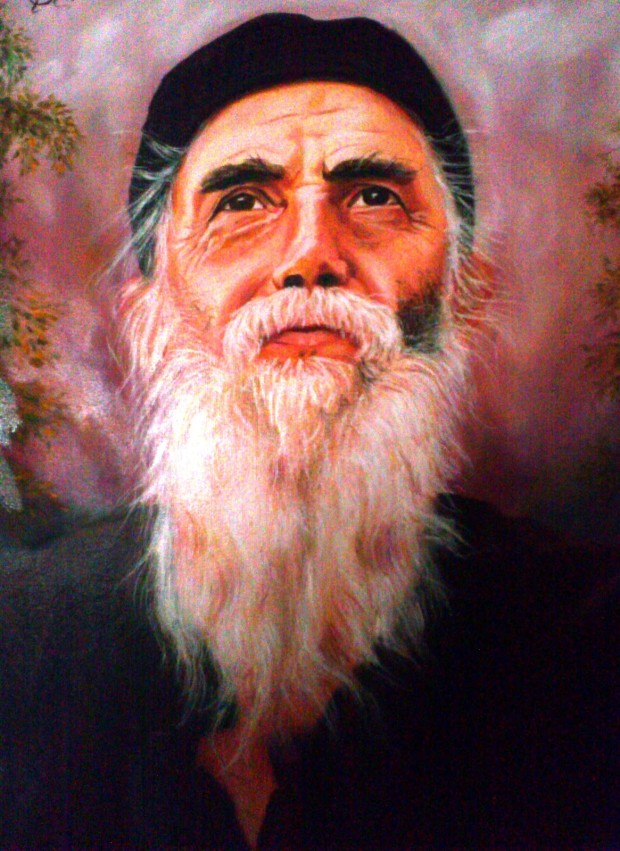Friday, August 30, 2013
Παρακαλάμε για τη Βασιλεία των ουρανών και συνάμα χασμουριόμαστε
Η ανταπόκριση του Κυρίου στην προσευχή δεν εξαρτάται από το πλήθος των λόγων, αλλ’ από τη νήψη του νου και της καρδιάς. Και αυτό μπορεί να το διαπιστώσει κανείς απ’ όσα λέει η Γραφή για τη στείρα Άννα, τη μητέρα του προφήτη Σαμουήλ. «Κύριε», έταξε η Άννα, «αν σκύψεις πάνω από τη θλίψη της δούλης σου και με θυμηθείς και μου δώσεις παιδί, τότε εγώ θα το αφιερώσω σ’ εσένα για όλη του τη ζωή» (Α’ Βασ. 1:11).
Είναι πολλά τα λόγια αυτά; Όχι. Και όμως, επειδή με νήψη και προσοχή έκανε αυτή τη μικρή προσευχή, κατόρθωσε όσα ηθέλησε: Και την ανάπηρη φύση της διόρθωσε και την κλεισμένη μήτρα της άνοιξε και από την περιφρόνηση των ομοεθνών της λυτρώθηκε και από την άγονη γη θέρισε σιτάρι πλούσιο. Όποιος προσεύχεται, λοιπόν, ας μη λέει περίσσια λόγια.
Και ο Χριστός και ο Παύλος, άλλωστε, μας σύστησαν να προσευχόμαστε συχνά, αλλά με συντομία και μικρά διαλείμματα. Γιατί, μακραίνοντας την προσευχή, είναι δυνατό να χάσεις την προσοχή. Κι έτσι δίνεις την ευκαιρία στο διάβολο να σε πλησιάσει και να σου υποβάλει τους δικούς του λογισμούς. Αν, όμως, οι προσευχές σου είναι σύντομες και συχνές, τότε θα μπορείς εύκολα να τις κάνεις με προσοχή και νήψη, καλύπτοντας μ’ αυτές όλο τον διαθέσιμο χρόνο σου. Θέλεις κι εσύ να μάθεις άγρυπνη προσευχή και προσοχή του νου και διαρκή παραμονή κοντά στο Θεό; Πήγαινε στην Άννα και μάθε τι έκανε εκείνη.
Σηκώθηκαν, λέει, όλοι από το τραπέζι (Α’ Βασ. 1:9). Ωστόσο, η Άννα δεν πήγε ούτε να κοιμηθεί ούτε ν’ αναπαυθεί. Έτρεξε στη Σκηνή του Μαρτυρίου για να προσευχηθεί. Απ’ αυτό συμπεραίνω πως, ακόμα κι όταν έτρωγε, δεν παραφόρτωνε το στομάχι της. Διαφορετικά, δεν θα μπορούσε να προσευχηθεί, και μάλιστα με τόσα δάκρυα.
Αν εμείς, όταν είμαστε νηστικοί, με δυσκολία κατορθώνουμε να προσευχηθούμε, ενώ ύστερ’ από τα συμπόσια ποτέ δεν προσευχόμαστε, πολύ περισσότερο εκείνη, μια γυναίκα, δεν θα προσευχόταν μ’ αυτόν τον τρόπο μετά το συμπόσιο, αν είχε καλοφάει. Ας ντραπούμε εμείς, οι άνδρες, που παρακαλάμε για τη βασιλεία των ουρανών και συνάμα χασμουριόμαστε, ας ντραπούμε, λέω, εκείνη τη γυναίκα, που παρακαλούσε κι έκλαιγε. Δες την ευλάβειά της κι από τούτο: «Μιλούσε από την καρδιά της· τα χείλη της μόλις που κινιόνταν και η φωνή της δεν ακουγόταν καθόλου» (Α’ Βασ. 1:13).
Άγιος Ιωάννης ο Χρυσόστομος
http://1myblog.pblogs.gr/2013/08/parakalame-gia-th-basileia-twn-oyranwn-kai-synama-hasmoyriomaste.html
The Christian weapon against evil ( Jesus Prayer )
The monks of the Holy Mountain teach us that through ascetic practices we are able to perfect quietude of body and mind and to arrive at a vision of the Uncreated Light of the Godhead. The use of our prayer rope together with the Jesus prayer “Lord Jesus Christ, Son of God, have mercy on me a sinner” is a means to achieve peace and sorrowful joy within the Christian Life.
We should use our sword or prayer rope at every opportunity because as Christian soldiers we fight on three fronts against the world, the flesh and the devil. When we mention the name of Jesus, (the name which is above all names), in faith we draw upon the Divine energy of God to calm our fears and to heal our troubled minds.
It may be that we are waiting at a bus stop and rather than wait with idle frustration we can use the time positively by employing our prayer rope in prayer – not in an ostentatious way but in order to quell our impatience, to bless God and to remember others who have asked us to pray for them. When we go to bed at night, before we lay ourselves down to sleep, then we can use our prayer rope again; offering all the unresolved conflicts, our missed opportunities, our failures … but also our thanks to God so that we may take our rest in peace. It is particularly beneficial for the soul to combine our prayer with fasting as it is so much more availing of the quiet we seek in our pressured and busy lives. We become more aware of God’s time (chairos) which is infinite and are not so worried about man’s time (chronos) which is created.
We say in the Holy Liturgy before the Great Entrance: “Let us now lay aside all the cares of this world.” So much of our anxiety is caused through the fact that we want to put ourselves first and at the centre of God’s universe. We want to follow our own desires, we want for ourselves power, status, money and those things which the evil one convinces us are necessary but as Christ said to Martha when she was anxious and fretful: “one thing is needful and Mary has chosen that greater part which shall not be taken away from her.”
Even those who affirm Christ find it difficult to be his forgiven creatures-others find excuses for their sins, wanting to justify their selfish actions. We must recognise two things:
1. God is Infinitely more powerful than we can imagine
2. The evil one wants to take us away from God.
The satan will use any means to do this, even, as the desert fathers teach us by appearing as an angel of light. We must allow God to be God, not to make the Almighty Creator in our image but to realise that we are made in His, with all the privileges and responsibilities that brings. Until we recognise these fundamental truths our strivings for hesychia will be in vain.
The Fathers teach us that the true theologian is the one who prays. Sometimes we find it difficult to pray but try … God listens to the broken hearted. If we find it impossible, ask someone to pray for you, go to the Icon of your patron saint or to the Panagia – the power of prayer and intercession is real and the response is quite disproportionate to our meagre offering or request. Prayer is that vital link with God our Creator, that intimate relationship which brings us life and which bears much fruit. Remember how our Lord Jesus says: ” I am the Vine, you are the branches.” The closer we are brought to Christ the greater our strength for we draw upon the Source of all Life … “Holy God, Holy and Strong , Holy and Immortal have mercy upon us.” Then we will have strength to withstand the world the flesh and the devil.
So stay close to God through attending the Holy Liturgy, through prayer and fasting and by making use of your prayer rope and God will give you the peace which passes all understanding and the strength to face the problems of life.
One last thing … we cannot achieve holiness and quietude overnight. The desert fathers said that “if you see a young man ascending to heaven catch him by the heels and bring him down to earth. Remember, you were nine months in the womb of your mother before you saw the light of day, and even then you depended upon her to feed you, to care for you and to protect you: her nurturing and love is constant up until the present day. How much more does Our Heavenly Father feed us and keep us until we grow into the likeness of Christ His Son who is the Light of the World.”
The struggle between good and bad- Angels and Demons
God sent us angels to be our traveling companions and our guides in this life, to guard us and protect us from all evil. They are also our most faithful allies in our struggle against the forces of evil.God is absolute Love, and this love impelled Him to create intelligent beings who would be able to comprehend love, to love God and participate in His bliss. The first such beings to be created were the angels. God endowed them with great abilities and settled them in His heavenly abode. However, though the angels possessed a great deal of perfection, they were not absolutely perfect, and so were open to the influence of passions.
Thus it came about that some of the angels, seduced by the thought of their limited perfections, entered a state of pride, which became the cause of their fall. Lucifer was the first to rebel in pride against his Creator, and he was followed by many other angels who left God. But to leave God means to leave life and embrace death. The rebellious spirits left God of their own accord, and the just Lord also left them, leaving them to their own will. And what consequently happened? The faithful angels separated themselves from the rebels and rejected them with horror, while the rebellious ones turned from bright angels into angels of darkness. Those who had just recently shone with divine glory, now became an object of revulsion and horror throughout the entire heaven and even to themselves. Those who had just recently sung the glory of God, now began to curse and blaspheme. Driven out from heaven by the bright angels and tormented by their own rage, they fell with the speed of lightning into the abyss of hell.
The angels who had remained faithful to God now became absolutely perfect. The Lord rules the universe together with them and uses them as His faithful messengers. The angels are like a model of the perfection and the majesty of God. Their minds and knowledge have no other limits except those imposed by God upon His own creation. The angels are also endowed with superior strength and might, by means of which they are able, in accordance with God’s will, to act upon bodies and the physical world.
But as much as the bright angels are perfect and blissful, so the fallen angels, together with their leader Satan, are horrible and evil. They are eternally tormented by an intense hatred of God, a desire for revenge and utter despair. This is what the struggle of good and evil is all about: it is the struggle of Satan against God and all His creation.
The action of evil forces in the world is quite evident, especially in our times. But from whence springs this great rage with which they are trying to destroy us? Being unable to attack God Himself, they attack Him through His creation, especially through man, who has been created in His likeness and image. What hellish pleasure they find in defiling this image and taking away from the Creator His favorite creation! Being unable to do good, the evil spirits feel a great satisfaction in making man participate in their crimes and share their punishment. And can Satan remain indifferent to us, knowing that we live in the hope of attaining the eternal bliss which he himself has lost? He becomes greatly enraged at the thought that the faithful followers of Jesus Christ, together with the bright angels, will judge him at the end of time. This envy burns him more powerfully than the flames of hell. For this he tries to move heaven and earth, just to lure us into his net. He turns all his anger against us and becomes most dangerous when he attacks not openly, but with the various enticements and wiles of his devious mind.
But it is at this point that the angels come to help us! In order to encourage and support His creation, His faithful sons, in their fierce and unequal battle with the forces of evil, the Lord sends us His angels, His heavenly troops. To each of us He assigns one of them, who becomes our guardian angel, our protector. And it is not only each Christian who has his own guardian angel, but each family, each pious society, each nation. The angels are the friends and brothers of the people on earth. They are so imbued with the love of God, that they immensely love us, too, because in us they see the same gifts of God’s grace which they themselves possess. Truly, in the words of King David, man is a being who is only slightly lower than the angels.
The angels love us and participate wholeheartedly in our salvation, which is just as precious to them as their own holiness. They feel great joy at our salvation and do their utmost to keep us on the right path.
Guardian angel
Let us love and value these wonderful friends and helpers of ours, especially our guardian angel; let us constantly turn to them in prayer, as to our nearest and dearest, so that together with them we would be able to enjoy eternal life in heavenly bliss!!
The pain some people have to bear…( Elder Porphyrios )
You should see the pain that some people have to bear!
They are good people, but both their children, Costas and Maria, have become fanatical followers of Sai Baba of India. Costas was a medical student. He left home along with his sister just before Easter. As they were leaving the house, the father said to his daughter: ‘Joyous Resurrection, Maria!’
‘The Resurrection has come, father, but people haven’t recognized it,’ she replied.
In the meantime their parents continually gave them money, Now they have stopped this because they (their children) were using it for their ‘god’. Costas went to Thessalonica to spread his propaganda. Indeed, he was beaten up there. He tried to proselytize some young people up there and their parents got a hold of him and beat him up.
These good people brought me a periodical. On the cover there is a photograph of Sai Baba. He has created a new religion in which they believe that he is the new Christ who came into the world to save it and to lead it to truth. They say he is the ‘new God’. Sai Baba is alive now. He is married and has his wife and two children next to him. At the bottom of the photograph we see lots of young people who are his followers; may of them, indeed, are educated people. How did these educated young people end up there? On another page they are kissing his feet. ‘The days of that Christ’ – the true Christ, that is – ‘are over now,’ he tells them, ‘This is another age,’ he tells you. Everything now is changing. Its like a fairy tale. Perhaps Sai Baba is mad. They say he has collected a lot of money.
I’ll tell you about another related incident.
One day an officer in the Greek Navy took me down tot he waterfront at Oropos. We walked along the breakwater where a man was fishing. I said to the officer:
‘Go and get me one of the fish that man is catching.’
The fisherman, however, replied:
‘The basket is empty. I’ve been here since the morning and I’ve caught nothing. Go and leave me in peace…’
I said to him:
‘Throw your hook into the sea.’
‘Go away,’ he said to us in an aggravated tone of voice.
We turned to go, but at that moment, just as the fisherman threw his line into the sea he felt a bite on it. He drew in the line and a large fish was struggling on the hook. He shouted to us:
‘Don’t go! Come here! Don’t go away, I’ve caught a fish!’
The officer said:
‘I know why that happened Father. It happened so that I would believe in you, that you are of God, and so that the fisherman would believe. Up till now I believed in the new Christ, the Sai Baba of India. Now I believe in the true Christ.’
Christ in our midst!
Wounded by Love by Elder Porphyrios
Ο δρόμος της ευτυχίας ( Αγιος Νεκταριος )
Τίποτα δὲν εἶναι μεγαλύτερο ἀπὸ τὴν καθαρὴ καρδιά, γιατί μία τέτοια καρδιὰ γίνεται θρόνος τοῦ Θεοῦ. Καὶ τί εἶναι ἐνδοξότερο ἀπὸ τὸ θρόνο τοῦ Θεοῦ; Ἀσφαλῶς τίποτα. Λέει ὁ Θεὸς γι’ αὐτοὺς ποὺ ἔχουν καθαρὴ καρδιά: «Θὰ κατοικήσω ἀνάμεσά τους καὶ θὰ πορεύομαι μαζί τους. Θὰ εἶμαι Θεός τους, κι αὐτοὶ θὰ εἶναι λαός μου».
Ποιοὶ λοιπὸν εἶναι εὐτυχέστεροι ἀπ’ αὐτοὺς τοὺς ἀνθρώπους; Καὶ ἀπὸ ποιὸ ἀγαθὸ μπορεῖ νὰ μείνουν στερημένοι; Δὲν βρίσκονται ὅλα τ’ ἀγαθὰ καὶ τὰ χαρίσματα τοῦ Ἁγίου Πνεύματος στὶς μακάριες ψυχές τους; Τί περισσότερο χρειάζονται; Τίποτα, στ’ ἀλήθεια, τίποτα! Γιατί ἔχουν στὴν καρδιά τους τὸ μεγαλύτερο ἀγαθό: τὸν ἴδιο τὸ Θεό!
Πόσο πλανιοῦνται οἱ ἄνθρωποι ποὺ ἀναζητοῦν τὴν εὐτυχία μακριὰ ἀπὸ τὸν ἑαυτό τους, στὶς ξένες χῶρες καὶ στὰ ταξίδια, στὸν πλοῦτο καὶ στὴ δόξα, στὶς μεγάλες περιουσίες καὶ στὶς ἀπολαύσεις, στὶς ἡδονὲς καὶ σ’ ὅλες τὶς χλιδὲς καὶ ματαιότητες, ποὺ κατάληξή τους ἔχουν τὴν πίκρα! Ἡ ἀνέγερση τοῦ πύργου τῆς εὐτυχίας ἔξω ἀπὸ τὴν καρδιά μας, μοιάζει μὲ οἰκοδόμηση κτιρίου σὲ ἔδαφος ποὺ σαλεύεται ἀπὸ συνεχεῖς σεισμούς. Σύντομα ἕνα τέτοιο οἰκοδόμημα θὰ σωριαστεῖ στὴ γῆ...
Ἀδελφοί μου! Ἡ εὐτυχία βρίσκεται μέσα στὸν ἴδιο σας τὸν ἑαυτό, καὶ μακάριος εἶναι ὁ ἄνθρωπος ποὺ τὸ κατάλαβε αὐτό. Ἐξετᾶστε τὴν καρδιά σας καὶ δεῖτε τὴν πνευματική της κατάσταση. Μήπως ἔχασε τὴν παρρησία της πρὸς τὸ Θεό; Μήπως ἡ συνείδηση διαμαρτύρεται γιὰ παράβαση τῶν ἐντολῶν Του; Μήπως σᾶς κατηγορεῖ γιὰ ἀδικίες, γιὰ ψέματα, γιὰ παραμέληση τῶν καθηκόντων πρὸς τὸ Θεὸ καὶ τὸν πλησίον; Ἐρευνῆστε μήπως κακίες καὶ πάθη γέμισαν τὴν καρδιά σας, μήπως γλίστρησε αὐτὴ σὲ δρόμους στραβοὺς καὶ δύσβατους...
Δυστυχῶς, ἐκεῖνος ποὺ παραμέλησε τὴν καρδιά του, στερήθηκε ὅλα τ’ ἀγαθὰ κι ἔπεσε σὲ πλῆθος κακῶν. Ἔδιωξε τὴ χαρὰ καὶ γέμισε μὲ πίκρα, θλίψη καὶ στενοχώρια. Ἔδιωξε τὴν εἰρήνη καὶ ἀπόκτησε ἄγχος, ταραχὴ καὶ τρόμο. Ἔδιωξε τὴν ἀγάπη καὶ δέχτηκε τὸ μίσος. Ἔδιωξε, τέλος, ὅλα τὰ χαρίσματα καὶ τοὺς καρποὺς τοῦ Ἁγίου Πνεύματος, ποὺ δέχτηκε μὲ τὸ βάπτισμα, καὶ οἰκειώθηκε ὅλες τὶς κακίες ἐκεῖνες, ποὺ κάνουν τὸν ἄνθρωπο ἐλεεινὸ καὶ τρισάθλιο.
Ἀδελφοί μου! Ὁ Πολυέλεος Θεὸς θέλει τὴν εὐτυχία ὅλων μας καὶ σ’ αὐτὴ καὶ στὴν ἄλλη ζωή. Γί’ αὐτὸ ἵδρυσε τὴν ἁγία Του Ἐκκλησία. Γιὰ νὰ μᾶς καθαρίζει αὐτὴ ἀπὸ τὴν ἁμαρτία, νὰ μᾶς ἁγιάζει, νὰ μᾶς συμφιλιώνει μαζί Του, νὰ μᾶς χαρίζει τὶς εὐλογίες τοῦ οὐρανοῦ.
Ἡ Ἐκκλησία ἔχει ἀνοιχτὴ τὴν ἀγκαλιά της, γιὰ νὰ μᾶς ὑποδεχθεῖ. Ἂς τρέξουμε γρήγορα ὅσοι ἔχουμε βαριά τη συνείδηση. Ἂς τρέξουμε καὶ ἡ Ἐκκλησία εἶναι ἕτοιμη νὰ σηκώσει τὸ βαρὺ φορτίο μας, νὰ μᾶς χαρίσει τὴν παρρησία πρὸς τὸ Θεό, νὰ γεμίσει τὴν καρδιά μας μὲ εὐτυχία καὶ μακαριότητα...
Ἀπὸ τὴ σειρὰ τῶν φυλλαδίων «Η ΦΩΝΗ ΤΩΝ ΠΑΤΕΡΩΝ» τῆς Ἱερᾶς Μονῆς Παρακλήτου Ὠρωποῦ Ἀττικῆς.
Η Ορθοδοξια εἶναι ἡ θρησκεία τῶν θρησκειῶν...( Γεροντας Πορφύριος )
Ἡ θρησκεία μας εἶναι ἡ θρησκεία τῶν θρησκειῶν, ἡ ἐξ ἀποκαλύψεως, ἡ πραγματική, ἡ ἀληθινή θρησκεία. Οἱ ἄλλες θρησκεῖες εἶναι ἀνθρώπινες, κούφιες. Δέν γνωρίζουν τό μεγαλεῖο τοῦ Τριαδικοῦ Θεοῦ. Δέν γνωρίζουν ὅτι ὁ σκοπός μας, ὁ προορισμός μας, εἶναι νά γίνομε θεοί κατά χάριν, νά ὁμοιωθοῦμε μέ τόν Θεό τόν Τριαδικό, νά γίνομε ἕνα μέ Ἐκεῖνον καί μεταξύ μας. Αὐτά οἱ ἄλλες θρησκεῖες δέν τά γνωρίζουν. Ὁ ἀπώτερος σκοπός τῆς θρησκείας μας εἶναι τό «ἵνα ὦσιν ἕν». Ἐκεῖ ὁλοκληρώνεται τό ἔργο τοῦ Χριστοῦ. Ἡ θρησκεία μας εἶναι ἀγάπη, εἶναι ἔρωτας, εἶναι ἐνθουσιασμός, εἶναι τρέλα, εἶναι λαχτάρα τοῦ θείου. Εἶναι μέσα μας ὅλ' αὐτά. Εἶναι ἀπαίτηση τῆς ψυχῆς μας ἡ ἀπόκτησή τους.
Γιά πολλούς, ὅμως, ἡ θρησκεία εἶναι ἕνας ἀγώνας, μία ἀγωνία κι ἕνα ἄγχος. Γι' αὐτό πολλούς ἀπ' τούς «θρήσκους» τούς θεωροῦνε δυστυχισμένους, γιατί βλέπουν σέ τί χάλια βρίσκονται. Κι ἔτσι εἶναι πράγματι. Γιατί, ἄν δέν καταλάβει κανείς τό βάθος τῆς θρησκείας καί δέν τή ζήσει, ἡ θρησκεία καταντάει ἀρρώστια καί μάλιστα φοβερή. Τόσο φοβερή, πού ὁ ἄνθρωπος χάνει τόν ἔλεγχο τῶν πράξεών του, γίνεται ἄβουλος κι ἀνίσχυρος, ἔχει ἀγωνία κι ἄγχος καί φέρεται ὑπό τοῦ κακοῦ πνεύματος. Κάνει μετάνοιες, κλαίει, φωνάζει, ταπεινώνεται τάχα, κι ὅλη αὐτή ἡ ταπείνωση εἶναι μία σατανική ἐνέργεια. Ὁρισμένοι τέτοιοι ἄνθρωποι ζοῦνε τή θρησκεία σάν ἕνα εἶδος κολάσεως. Μέσα στήν ἐκκλησία κάνουν μετάνοιες, σταυρούς, λένε, «εἴμαστε ἁμαρτωλοί, ἀνάξιοι», καί μόλις βγοῦνε ἔξω, ἀρχίζουν νά βλασφημᾶνε τά θεία, ὅταν κάποιος λίγο τους ἐνοχλήσει. Φαίνεται καθαρά ὅτι ὑπάρχει στό μέσον δαιμόνιο.
Στήν πραγματικότητα, ἡ χριστιανική θρησκεία μεταβάλλει τόν ἄνθρωπο καί τόν θεραπεύει. Ἡ κυριότερη, ὅμως, προϋπόθεση, γιά νά ἀντιληφθεῖ καί νά διακρίνει ὁ ἄνθρωπος τήν ἀλήθεια, εἶναι ἡ ταπείνωση. Ὁ ἐγωισμός σκοτίζει τό νοῦ τοῦ ἀνθρώπου, τόν μπερδεύει, τόν ὁδηγεῖ στήν πλάνη, στήν αἵρεση. Εἶναι σπουδαῖο νά κατανοήσει ὁ ἄνθρωπος τήν ἀλήθεια.
Παλαιά οἱ ἄνθρωποι, πού ἦταν σέ μία κατάσταση πρωτόγονη, δέν εἶχαν οὔτε σπίτια οὔτε τίποτα. Μπαίνανε μές στίς σπηλιές χωρίς παράθυρα, κλείνανε καί τήν εἴσοδο μπροστά μέ πέτρες καί μέ κλαδιά, ὥστε νά μήν μπαίνει ὁ ἀέρας. Δέν καταλάβαιναν ὅτι ἔξω ὑπάρχει ἡ ζωή, τό ὀξυγόνο. Μές στή σπηλιά ὁ ἄνθρωπος φθείρεται, ἀρρωσταίνει, καταστρέφεται, ἐνῶ ἔξω ζωογονεῖται. Μπορεῖς νά καταλάβεις τήν ἀλήθεια; Τότε εἶσαι στόν ἥλιο, στό φῶς, βλέπεις ὅλα τά μεγαλεῖα- ἀλλιῶς εἶσαι σέ μιά σπηλιά σκοτεινή. Φῶς καί σκότος. Ποιό εἶναι τό πιό καλό; Νά εἶσαι πράος, ταπεινός, ἥσυχος, νά ἔχεις μέσα σου ἀγάπη ἤ νά εἶσαι νευρικός, στενόχωρος, νά διαπληκτίζεσαι μέ τούς πάντες; Ἀσφαλῶς τό ἀνώτερο εἶναι ἡ ἀγάπη. Ἡ θρησκεία μας ἔχει ὅλ' αὐτά τά καλά καί εἶναι ἡ ἀλήθεια. Ὅμως πολλοί πᾶνε σέ κάτι ἄλλο.
Ὅσοι ἀρνοῦνται αὐτή τήν ἀλήθεια, εἶναι ἄρρωστοι ψυχικά. Εἶναι σάν τά ἄρρωστα παιδιά, πού, ἐπειδή τούς ἔλειψαν οἱ γονεῖς ἤ χώρισαν ἤ μάλωσαν, ἔγιναν ἀπροσάρμοστα. Καί στίς αἱρέσεις πᾶνε ὅλοι οἱ μπερδεμένοι. Μπερδεμένα παιδιά μπερδεμένων γονέων. Ὅμως ὅλοι αὐτοί οἱ μπερδεμένοι καί ἀπροσάρμοστοι ἔχουν ἕνα σθένος καί μιά ἐπιμονή καί κατορθώνουν πολλά πράγματα. Ὑποτάσσουν τούς νορμάλ καί τούς ἥσυχους ἀνθρώπους, διότι ἐπηρεάζουν κι ἄλλους ὁμοίους τους καί ὑπερτεροῦν καί στόν κόσμο, γιατί αὐτοί εἶναι πιό πολλοί καί βρίσκουν ὀπαδούς. Ὑπάρχουν κι ἄλλοι, πού, ἐνῶ δέν ἀρνοῦνται τήν ἀλήθεια, ἐν τούτοις εἶναι μπερδεμένοι κι ἄρρωστοι ψυχικά.
Ἡ ἁμαρτία κάνει τόν ἄνθρωπο πολύ μπερδεμένο ψυχικά. Τό μπέρδεμα δέν φεύγει μέ τίποτα. Μόνο μέ τό φῶς τοῦ Χριστοῦ γίνεται τό ξεμπέρδεμα. Τήν πρώτη κίνηση τήν κάνει ὁ Χριστός. «Δεῦτε πρός μέ πάντες οἱ κοπιῶντες...» . Μετά ἐμεῖς οἱ ἄνθρωποι ἀποδεχόμαστε αὐτό τό φῶς μέ τήν ἀγαθή μας προαίρεση, πού τήν ἐκφράζουμε μέ τήν ἀγάπη μας ἀπέναντί Του, μέ τήν προσευχή, μέ τή συμμετοχή στή ζωή τῆς Ἐκκλησίας, μέ τά Μυστήρια.
Πολλές φορές οὔτε ὁ κόπος, οὔτε οἱ μετάνοιες, οὔτε οἱ σταυροί προσελκύουν τήν χάρι. Ὑπάρχουν μυστικά. Τό οὐσιαστικότερο εἶναι νά φεύγεις ἀπ' τόν τύπο καί νά πηγαίνεις στήν οὐσία. Ὅ,τι γίνεται, νά γίνεται ἀπό ἀγάπη.
Ἡ ἀγάπη ἐννοεῖ πάντα νά κάνει θυσίες. Σ' ὅ,τι κάνεις ἀγγάρια, κλωτσάει ἡ ψυχή, ἀντιδρᾶ. Ἡ ἀγάπη ἑλκύει τήν χάρι τοῦ Θεοῦ. Ὅταν ἔλθει ἡ χάρις, ἔρχονται τά χαρίσματα τοῦ Ἁγίου Πνεύματος. «Ὁ δέ καρπός τοῦ Πνεύματος ἐστιν ἀγάπη, χαρά, εἰρήνη, μακροθυμία, χρηστότης, ἀγαθωσύνη, πίστις, πραότης, ἐγκράτεια» . Αὐτά εἶναι πού πρέπει νά ἔχει μία ὑγιής ψυχή ἐν Χριστῷ.
Ὁ ἄνθρωπος μέ τόν Χριστό γίνεται χαριτωμένος καί ζεῖ ἔτσι πάνω ἀπ' τό κακό. Τό κακό γι' αὐτόν δέν ὑπάρχει. Ὑπάρχει μόνο τό ἀγαθό, ὁ Θεός. Δέν μπορεῖ νά ὑπάρχει κακό. Δηλαδή, ἐφόσον ἔχει τό φῶς, δέν μπορεῖ νά ἔχει σκοτάδι. Οὔτε μπορεῖ νά τόν καταλάβει τό σκοτάδι, διότι ἔχει τό φῶς.
(Γέροντος Πορφυρίου, Βίος καί Λόγοι σελ. 210 213)
Thursday, August 29, 2013
Silence for the monks is a rule of life. ( Elder Joseph of Vatopedi )
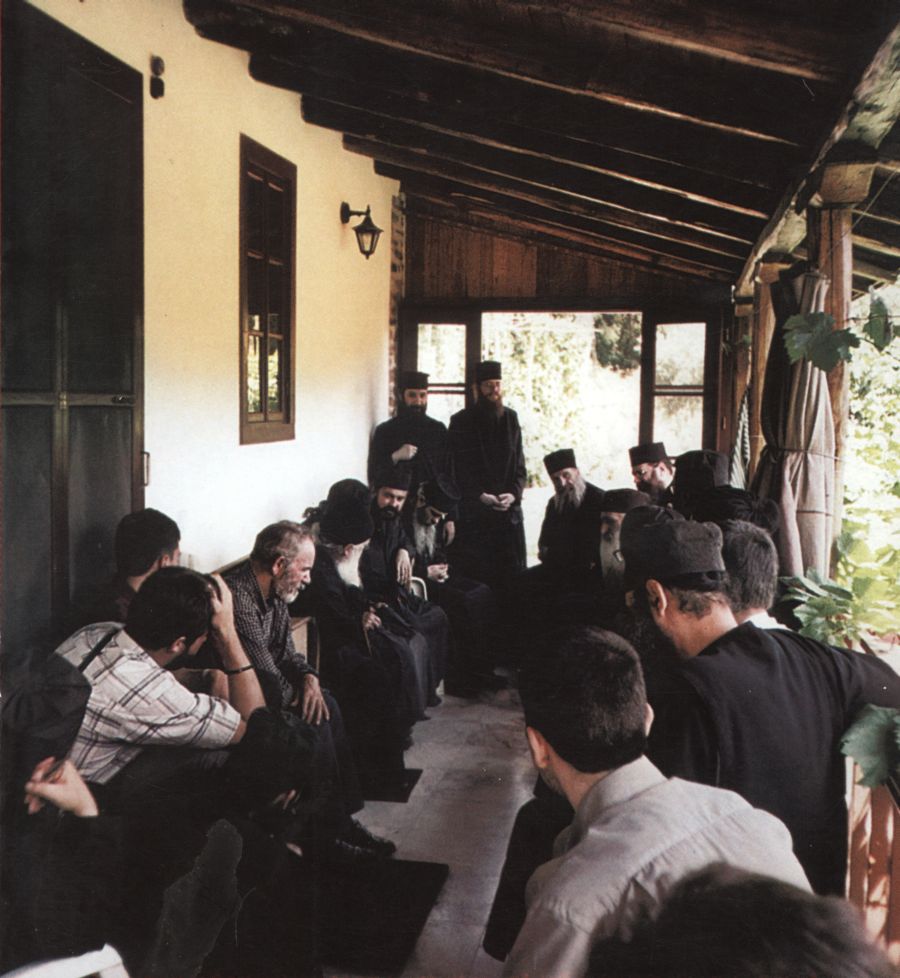
Silence for the monks is a rule of life. It protects them from uncontrollable and unrestrained talk as well as from impugnation and slander, which result in the death of the soul. It delivers them from wrangle and strife and preserves in them internal peace which is necessary for inwardness. Silence is the fruit of quietude, an internal state which gives birth to spiritual discourse.
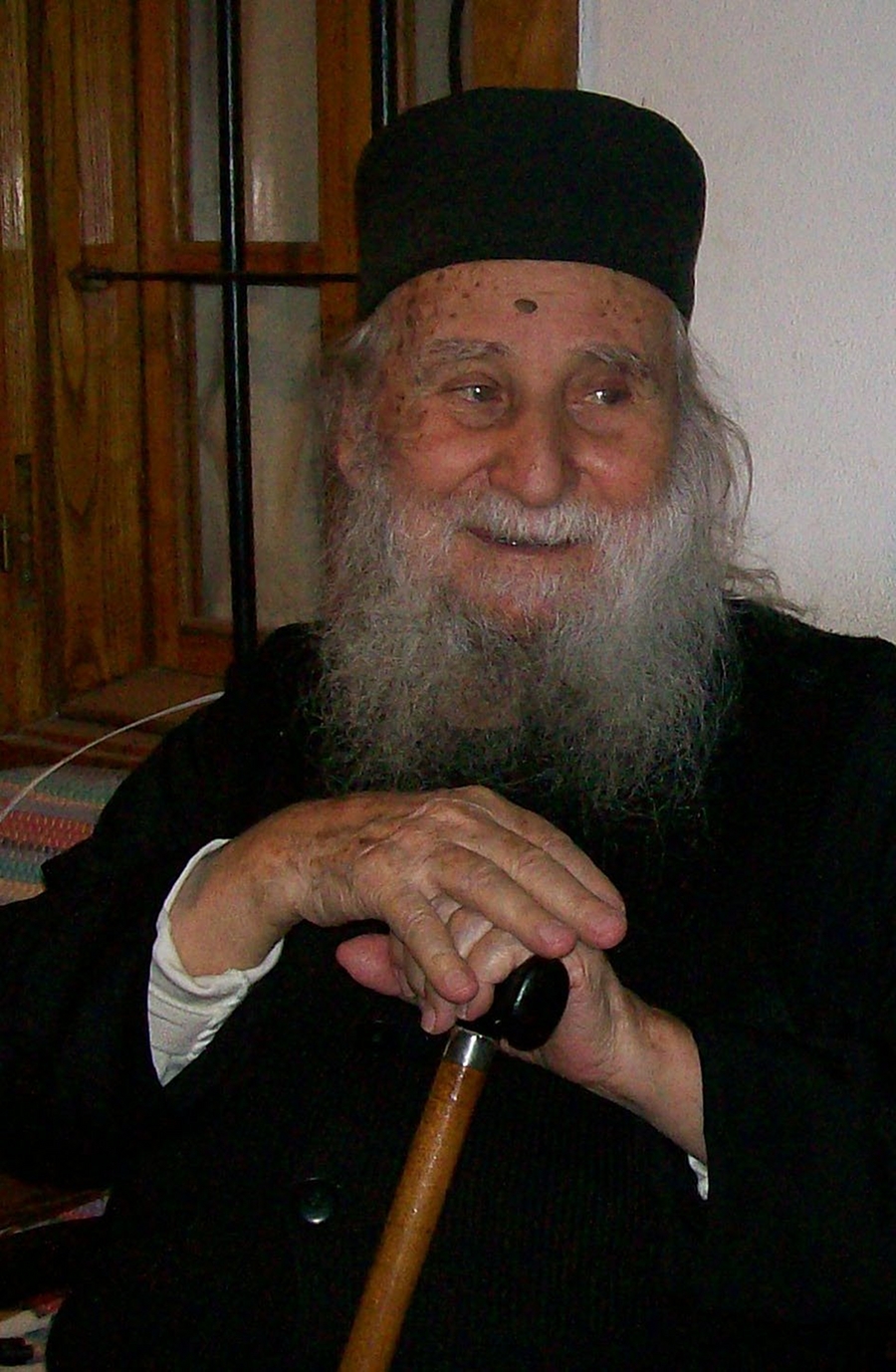
-When does the monk ought to keep quiet and when does he ought to talk?
Abbot Pimen offers a solution to the issue with great discernment: “A brother asked Abbot Pimen saying: ‘which is best: to talk or to keep quiet?’And the Elder tells him: ‘Whoever talks for the sake of God, does well. Whoever keeps quiet for the sake of God, does equally well’”.
Silence is not the goal but the means. One uses it either to approach God or to talk about Him.
The Elders, those old warriors and much experienced strugglers in the spiritual arena, are forced to become spiritual teachers and coaches for those Christians who approach them either out of curiosity, or interest, or because of a deeper spiritual need. They fire at them demanding questions on serious and basic spiritual issues. “Father, tell me something. How can I be saved? Give me a word! What shall I do about my passions? Give me a command and I will obey! To what shall I adhere in order to please God?”
Often the Elders give a brief, general reply like an apothegm. Their words are not philosophical- i.e. the result of an intellectual process. They are ripe and full of pain, direct, forceful and without frills, which pierce the internal depths of the soul of the inquirer.
They use simple words, without adorned intellectual rhetoric; they reveal the hidden treasure of spiritual life and hand out messages which are always contemporary. Thus, they become beacons to those who are wrangling in the dark seas of confusion and delusion.
The Elders- humble, unknown and undetected ascetics- penetrate the souls of their interlocutors with discernment and their replies are in accordance to their real needs. The purpose of their talk is “such as is good for building up, as fits the occasion, that it may give grace to those who hear” (Ephesians 4, 29).
They avoid replying to inquiries if those who ask are able to see their deeds and their example. Once, when a brother asked Abbot Sisoeh: “Tell me something”, he replied: “Why do you force me to engage in idle talk? Do as you see.”
The words which come out of the Elders’ mouths are practical and have practical aims- to assist in the attainment of perfection and sanctification “in Christ”. They are words filled with love. As one may discern from the tradition of the Church, the Elders confess that “this give and take is a matter of love to me”. The practical implementation of the most crucial virtue, that of love, has created the term “act lovingly” («ποιείν αγάπην») for monasticism.
When Abbot Theodore of Thermis approached Abbot Pamvo to ask for counsel, he replied: “Go and show mercy to everyone, since mercy has found favor in the face of the Lord”.
In the first part of this book, our most holy Elder Joseph, moved by sheer love, has written the replies to the queries and worries posed by our cherished visitors. In the second part, which is titled “Philokaliko Apanthisma” we have translated into Modern Greek short excerpts from passages from the book of Philokalia and the Fathers of the Church, which are relevant to the questions posed.
We wish that this book assists those devout brothers, who are engaged in the spiritual struggle while still in the outside world, to accomplish sanctification without which “no one will see God”.
The Abbot of the Great and Holy Monastery of Vatopedi,
Archimandrite Efrem
Sunday of the Myrrh bearing women, 2003
*** Excerpts from the book ‘Discourse on Mount Athos’ by Elder Joseph of Vatopedi.
Hermit of Mount Athos
It is incredibly daring for one to believe that one may describe the life of someone who is a friend of the Lord, who is a spiritual person and who according to the Scriptures “he judges everything but no one can dare judge him” [1 Cor. 2:15]. Therefore we will not describe his life, but we will simply give a minimal account of the way he lived, since as it happens, he had been our acquaintance.
This ‘most holy’ man, as I, without hesitation, describe brother George, was known as ‘Branko’ the Serb. He approached our blessed elder Joseph the Hesychast, when we used to live at New Skete in order to receive some spiritual advice. It was on this ground that we came to meet with him and have known him until the end of his life, when this ended prematurely so that, as the Scriptures say, “vice will not change his prudence nor evil intention deceives his soul”. His brothers in the Holy Monastery of Hilandar know better the reasons behind his return to devoutness. Therefore, we will leave these for them to describe, while we will only refer to what he himself has relayed to us.
We must say that even though he did not speak good Greek initially he also avoided talking about anything which he did not intend to be of any spiritual benefit. Nevertheless, he seemed inflamed with godly zeal, and zealously followed even the most insignificant details of our monastic order. We had a lot to learn from his perfect attitude, especially his introversion, one of his special charisms. One of the initial questions he was asking our Elder was: Why did divine Grace, which visited him initially in order to attract him to goodness, lessened now that he had especially come to its source, the Holy Mountain Athos, to continue his life as a monk? Then our Elder, very patiently and speaking very slowly so that he could make himself understood because George did not speak Greek very well, explained that this is how things are and how grace habitually behaves towards those it beckons to the spiritual stage. Later, blessed George was wondering whether it was necessary to return to France - the place where he used to study when divine Grace visited him and revealed its mysteries - because holy Grace had weakened when he came here once he had acquired more comprehension of it.
“It did not get weaker, my child”, the Elder was explaining, “and it never will, since the holy charisms are fixed. It is the sense of the presence of grace which has been hidden, not its actual presence. Divine Grace usually appears in two ways. One is and is described as the ‘energy’ - theoria - of Grace and the other the ‘sense’ - aisthesis - of Grace, because it is comprehensible to us.
Divine Grace is always present in the faithful because without it no one would remain faithful. However, it appears, or rather it becomes obvious when it decides to console and enlighten the person who is worn-out, or ignorant, or in danger in his bitter trials. Divine Grace presented itself in a more obvious way, ‘as a sense’, in order to help you deny your former ways and attitudes and practice repentance which you had already started. Initially, you had been ignorant and had been questioning the mysteries of Faith and the practical ways of spiritual life. The first degree is 'renouncing the world' and 'parting from the world'. Holy grace has now receded; its obvious presence has been hidden, so that you can begin faithfully and in full obedience to God’s will to work for it by yourself as a result of your own struggle. This is the reason why Grace does not show itself so explicitly now as it did in the beginning when it beckoned you."
It is with these words that the Elder convinced devout George. Since then, not only did he never think about returning to France again, but he never ever parted with the Elder again and regarded him as a spiritual father. He used to stay with us for as long as he wanted and then he would return to the Russian Monastery of Saint Panteleimon - not actually inside the monastery, because he wanted to avoid the commotion - but on the “Palaiomonastero”, high on the mountains, as a designated guard. Blessed George not only kept silence, but also austere fasting. He would only eat dried bread, “paximadi” with water, unless he had to join other brothers or go to monasteries, where he would sit at the common table and eat in temperance. He also kept severe poverty and had almost nothing except the rags he wore. Even those clothes were very modest and humble. Once he stayed at the Monastery of Saint Paul, but he always preferred silence and went to places where he would live without care and quietly so that he would be able to continuously practice the Jesus Prayer.
He had apathetically endured two wounds on his body, which had always been pestering him, but he never bothered to seek any cure. When he was studying and was working at the same time in Europe, he wounded his knees in a car accident. He had taken care of the wounds at the time, but ever since his knees had remained sensitive. They had been bothering him and were open wounds when as a monk he had been standing for hours and did not seek any therapy. He would bind his legs with any rags he could find, but he was saying that they had been hurting him a lot. His predicament was also very obvious to the others.
The second wound was his tonsils. They had been so sensitive that his throat was swollen and it was difficult for him to speak. He had endured this problem without complaint and without medical care; he would only bind his neck with any rags he could find.
When he was staying at the Palaiomonastero, where the winters were bitterly cold and the temperatures several degrees below zero, he didn’t use any heating nor did he burn any wood fires even though they had been abundant. Neither did he cover himself with proper blankets, even though he could if he had wanted to. Living in such a harsh way was his rule of law and he never let go of this relentless habit till the day he died.
Once he left the Russian monastery and stayed with us in New Skete. I gave him my tiny cell for almost six months. It was situated towards the sea and above the caves. The monks at the Palaiomonastero had been looking for him since he was the guard. They probably needed him because they had also been few in numbers and had so many duties.
Once when I visited him, he told me that the monks had been insisting that he returned to the Russian monastery. Because he refused, they had been calling him “crazy”. Then I told him: "Never mind, brother Georgio, let them call you what they like, don’t be sad. Be obedient to them and you will gain merit from God”. He hugged me and his eyes filled with tears. Afterwards, he did return to the monastery and went on relentlessly in his harsh ways, eating only paximadi and tea, without any other consolation. On top of everything else, he also had his inflamed tonsils and his swollen throat to contend with. He only slept for three hours on his side, while the rest of the time he was standing up. He was steadfast in this. This is the reason why his legs were always swollen and fluid was gushing from his wounds.
This blessed man had another austere habit. He would never take Holy Communion unless he had prepared himself very well and examined his conscious exhaustively. As I have mentioned earlier, we passed by the tomb of our Elder Joseph before he left his tiny cell in New Skete to return to the Palaiomonastero. He kissed the tomb with devotion. “Had our Elder lived”, he said, “I would have always stayed with him”.
His attachment to our Elder was not just a simple acquaintance. It was a connection, a spiritual relationship which is recognized by all students who ever had teachers, or rather by all those obedient to their spiritual fathers. Some of the things which we have seen on this blessed man convinced us of this relationship. Whenever our Elder’s health was deteriorating, Father George would appear without us ever calling for him, or knowing where he was. During the last days of the life of our Elder, while we had been told to go to our cells, he had stayed with him and was holding a large carton and was trying to create some fresh air because our Elder had difficulties breathing. Therefore, he was the only one who bore witness to the last words and the passing away of our Elder. He also devotedly offered his help during the burial. He was also the first to appear from nowhere to help during the exhumation of the body, even though not even the closest to us had known of this event. He preserved our common spiritual relationship and we had loved him as our true spiritual brother. However, we had not been blessed to be present either at his burial or for the last rites. We had been upset to hear of our final separation. But we are pleased because his life ended after he had become a perfect example of a truly zealous, hard working Athonite monk, who had kept our patristic tradition as much as possible and had attested to the triumph of Orthodoxy. He is also the pride of Athos’ customs, which continuously offers witnesses to its tradition.
Indeed, he has become a brilliant case for the faithful people of his wounded and persecuted country, Serbia, to honor. He offers them the certain hope that their freedom is at hand by the grace of our Christ, our true God, his blessed Holy Mother, Mary, and our Great Saint Savva, who is the true protector of this country.
The Great and Holy Monastery of Vatopaidi, Elder Joseph monk, September 1988.
Οι δοκιμασίες είναι βαρύτερες στους πιστούς ( Άγιος Σιλουανός ο Αθωνίτης )

"Όλοι όσοι θέλουν να ζουν ευσεβώς, θα διωχθούν" (Β΄ Τιμ. 3/γ: 12) είπε ο απόστολος Παύλος.
Αυτό το "όλοι", δεν είναι τυχαίο. Ακόμα και ο Ίδιος ο Κύριος Ιησούς Χριστός, διώχθηκε: "Καταφρονημένος και απορριμμένος από τους ανθρώπους· άνθρωπος θλίψεων και δόκιμος ασθένειας· και σαν άνθρωπος από τον οποίο κάποιος αποστρέφει το πρόσωπο, καταφρονήθηκε, και τον θεωρήσαμε σαν ένα τίποτα" (Ησαίας 53/νγ: 3). Και το ίδιο είπε ότι θα συνέβαινε στους ακολούθους Του: "Να θυμάστε τον λόγο, που εγώ σας είπα: Δεν υπάρχει δούλος μεγαλύτερος από τον κύριό του. Αν εμένα δίωξαν, θα διώξουν και σας· αν φύλαξαν τον λόγο μου, θα φυλάξουν και τον δικό σας" (Ιωάννης 15/ιε: 20).
Και όχι μόνο από διωγμούς θα έπασχαν οι πιστοί, αλλά από κάθε είδους θλίψη: "Μέσα στον κόσμο θα έχετε θλίψη· αλλά, να έχετε θάρρος· εγώ νίκησα τον κόσμο" (Ιωάννης 16/ις: 33).
Και δήλωσε: "Αν κάποιος θέλει νάρθει πίσω μου, ας απαρνηθεί τον εαυτό του, κι ας σηκώσει τον σταυρό του, κι ας με ακολουθεί. Επειδή, όποιος θέλει να σώσει τη ζωή του, θα τη χάσει· και όποιος χάσει τη ζωή του, εξαιτίας μου, θα τη βρει" (Ματθαίος 16/ις: 23,24).
Έχοντας υπ’ όψιν αυτά τα λόγια, που πολλοί από εμάς τα έχουμε βιώσει "στο πετσί μας", παίρνουμε θάρρος μέσα από τις θλίψεις, καθώς βιώνουμε καθημερινά τα λόγια του αποστόλου Παύλου: "σε κάθε τι συνιστώντας τον εαυτό μας ως υπηρέτες τού Θεού, με πολλή υπομονή, με θλίψεις, με ανάγκες, με στενοχώριες, με ραβδισμούς, με φυλακές, με ακαταστασίες, με κόπους, με αγρυπνίες, με νηστείες· με καθαρότητα, με γνώση, με μακροθυμία, με αγαθότητα, με Πνεύμα Άγιο, με αγάπη ανυπόκριτη· με λόγο αλήθειας, με δύναμη Θεού· με τα όπλα τής δικαιοσύνης, τα δεξιά και τα αριστερά· με δόξα και ατιμία, με συκοφαντία και με εγκωμιασμό· σαν πλάνοι, όμως κάτοχοι της αλήθειας· σαν αγνοούμενοι, αλλά είμαστε καλά γνωστοί· σαν να φτάνουμε στον θάνατο, αλλά, δέστε, ζούμε· σαν να περνάμε από παιδεία, αλλά δεν θανατωνόμαστε· σαν λυπούμενοι, αλλά πάντοτε έχουμε χαρά· σαν φτωχοί, όμως πλουτίζουμε πολλούς· σαν να μη έχουμε τίποτε, όμως τα πάντα κατέχουμε" (Β΄ Κορ. 6/ς: 4-10).
Θυμάμαι σαν σήμερα, τα λόγια ενός φίλου απίστου, για τη ζωή του νονού μου, τον οποίο ο Θεός ευλόγησε με χαρίσματα του Αγίου Πνεύματος, αλλά κατά κόσμον θλιβόταν υπερβολικά ως τον θάνατό του. Μου είπε ο άπιστος εκείνος:
"Μα πώς είναι δυνατόν ο Θεός να επιτρέπει να βασανίζεται τόσο ένας δικός Του; Αν είχατε την αληθινή πίστη, δεν θα ήταν η ζωή του ένα βασανιστήριο. Να μην έχει δουλειά, να τον κοροϊδεύουν οι εργοδότες, να αρρωσταίνει, να γκρεμίζεται το σπίτι του, να θλίβεται τόσο πολύ!
Αυτό δεν είναι πίστη, είναι πλάνη!" Και πράγματι, είχα δει κι εγώ αυτόν τον ευλογημένο άνθρωπο, να προσεύχεται με δάκρυα, να ζητάει από τον Θεό να τον πάρει "ΤΩΡΑ!". (Και πράγματι, έφυγε νέος, όταν ο αγώνας του έφθασε στην τελείωση). Απάντησα στον άπιστο φίλο μου, ότι αυτή είναι η εν Χριστώ ζωή.
Όχι χαρά και διασκέδαση, αλλά θλίψη και πόνος, και δοκιμασία. Αλλά δεν μπορούν αυτό να το δεχθούν όλοι. Μάλιστα θα έλεγα, ότι αν κάποιος δεν βιώνει αυτή τη θλίψη στη Χριστιανική του ζωή, κάτι δεν πάει καλά με αυτόν. Θα πρέπει να ανησυχεί! Γιατί δεν γνωρίζω ΚΑΝΕΝΑΝ που να προοδεύει στην εν Χριστώ ζωή, χωρίς να υφίσταται δοκιμασίες και θλίψεις.
Άγιος Σιλουανός ο Αθωνίτης
Ο Γέροντας Παΐσιος ο Αγιορείτης και η ταπείνωση
Σαν σήμερα εκοιμήθη ο διδάσκαλος της νοεράς προσευχής του Αγίου Όρους γέροντας Ιωσήφ ο Ησυχαστής
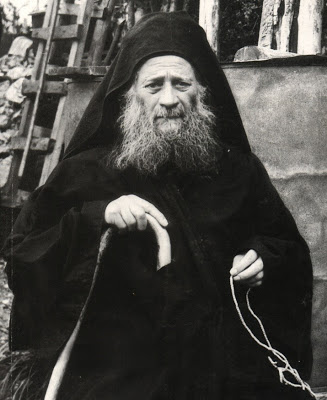 Επειδή σήμερα είναι μνήμη της κοιμήσεως του Αγίου Γέροντος Ιωσήφ, δημοσιεύουμε κάποια αποσπάσματα από το βιβλίο: «Ο Γέροντάς μου Ιωσήφ ο Ησυχαστής και σπηλαιώτης» του Γέροντος Εφραίμ του Φιλοθείτου. Την ευχούλα του να έχουμε!
Επειδή σήμερα είναι μνήμη της κοιμήσεως του Αγίου Γέροντος Ιωσήφ, δημοσιεύουμε κάποια αποσπάσματα από το βιβλίο: «Ο Γέροντάς μου Ιωσήφ ο Ησυχαστής και σπηλαιώτης» του Γέροντος Εφραίμ του Φιλοθείτου. Την ευχούλα του να έχουμε! Το τυπικό του Γέροντος Ιωσήφ: …Εκοιμώντο περίπου 3-4 ώρες, αλλά ο Φραγκίσκος (μετέπειτα μοναχός Ιωσήφ) δεν ξάπλωνε σε κρεββάτι. Συνήθως κοιμόταν καθιστός σε μία καρέκλα, και τις περισσότερες φορές όρθιος στηριζόμενος σε ένα μπαστούνι σε σχήμα Τ ή ακουμπώντας στον τοίχο.
Με την δύσι του ηλίου εγείροντο για να αρχίσουν την αγρυπνία τους. Δεν μιλούσαν μεταξύ τους, για να μην απωλέσουν την νηφαλιότητα, που χάριζε στον νού ο ύπνος.
Έπιναν σιωπηλά έναν καφέ για βοήθημα και απεσύροντο ο καθένας στο κελλί του για ολονύκτια προσευχή αν ήταν χειμώνας, κι αν ήταν καλοκαίρι στην ύπαιθρο σε απόστασι ο ένας από τον άλλον.
Άρχιζαν με το «Τρισάγιο», το «Πιστεύω» και τον «Ν΄ ψαλμό». Κατόπιν καθόντα λίγο και αδολεσχούσαν γύρω από τον θάνατο, την κόλασι, την χαρά των Δικαίων στους ουρανούς και ψυχωφελείς θεωρίες. Καί κατέληγαν με τη σκέψι πως όλοι θα σωθούν και μόνον αυτοί θα πάνε στην κόλασι. Έτσι ήρχοντο σε κατάνυξι, σε πένθος και μετάνοια. Δεν έμεναν όμως για πολύ σ΄αυτές τις σκέψεις. Μόλις συγκεντρωνόταν ο νούς και η καρδιά συνετρίβετο, άρχιζαν την ευχή…
Συνήθως έκαναν Νοερά προσευχή όρθιοι, για να καταπολεμήσουν τον ύπνο για 7-8 ώρες, με απόλυτη συγκέντρωσι, ταπείνωσι και συντριβή βυθίζοντας το νού μέσα στην καρδιά. Κατόπιν άρχιζαν τις μετάνοιες, που ήσαν περίπου 3.500 για τον καθένα τους, και εάν έκανε κρύο και περισσότερες! Διότι σπανίως αναβαν σόμπα, για να μην τους πολεμά ο ύπνος. Μετά τις μετάνοιες ακολουθούσε ο απαραίτητος μοναχικός κανόνας με κομποσχοίνια.
Μετά την θεία Λειτουργία, είχε ήδη ξημερώσει, έπιναν ένα ζεστό με λίγο παξιμάδι. Μερικές φορές, όχι πάντα, εάν ήσαν εξαντλημένοι από τους κόπους της αγρυπνίας, ανεπαύοντο άλλη μία ώρα περίπου. Μετά εσηκώνοντο και είτε έκανα πάλι προσευχή και μελέτη είτε έψαχναν για ασκητές προς ωφέλειάν τους. Έτσι αγγελικά ζούσαν οι δύο αγωνιστές. Μία ζωή αυστηρά ασκητική, μέσα στην αφάνεια, στην υπακοή στον πάπα-Δανιήλ τον Κατουνακιώτη και στη νυκτερινή προσευχή και λατρεία του Θεού.
Η Νοερά προσευχή ήταν η κυριότερη ασχολία του Γέροντος. Όλη του την δύναμι την εστίαζε στην καλλιέργεια αυτής της προσευχής. Όλες του τις δραστηριότητες τις ρύθμιζε, ώστε να έχει άνεσι ο νούς στην προσευχή. Όπως έγγραψε ο ίδιος: «Η νοερά προσευχή εις εμένα είναι όπως η τέχνη του καθενός, καθ΄ ότι εργάζομαι αυτήν τριαντέξ και επέκεινα χρόνια, δηλαδή, σ΄όλη την διάρκεια της μοναχικής του ζωής. Καί πράγματι, εργαζόταν στην προσευχή μεθοδικά και με τάξι. Προσευχόταν με επιμονή και βία, αλλά και με συντριβή και ταπείνωσι. Όλη του η ημέρα ήταν μία προετοιμασία για την νυκτερινή του προσευχή.
Κάναμε πολλές ώρες προσευχή τότε που ήμασταν κοντά στον Γέροντα Ιωσήφ, αλλά και στα πρώτα χρόνια μετά την κοίμησί του. Καί ήταν πλημμύρα η Χάρις που μου έδινε ο Κύριος, δι΄ευχών του Γέροντός μου, διότι έκαμε Νοερά προσευχή μέχρι δέκα ώρες όρθριος! Όταν με πολεμούσε ο διάβολος με πολλή κούρασι και αμέλεια, αισθανόμουν άσχημα και έλεγα στον εαυτό μου: «άρρωστος δεν είσαι! Έφαγες, ήπιες, λοιπόν εδώ θα αγωνισθής, θα πεθάνης εδώ προσευχόμενος!» Δεν υποχωρούσα. Καί μετά λίγην ώρα ήρχετο τόση παράκλησις, τέτοια ειρήνη και μακαριότης, που επί τέσσερις ώρες, νόμιζα ότι δεν πατούσα στην γη και ότι οι τέσσερις αυτές ώρες ήσαν 10 λεπτά. Την εποχή εκείνη είχα πολλές καταστάσεις. Ο Θεός μου είχε δώσει πολλή Χάρι»….
Θάνατος όντως οσιακός. Σε μας σκόρπισε αναστάσιμον αίσθησι. Μπροστά μας είχαμε νεκρόν και ήρμοζε πένθος, όμως μέσα μας ζούσαμε ανάστασι. Καί τούτο το αίσθημα δεν μας έλλειψε πλέον, αλλά με αυτό συνοδεύεται έκτοτε η ενθύμησις του αειμνήστου αγίου Γέροντός μας.
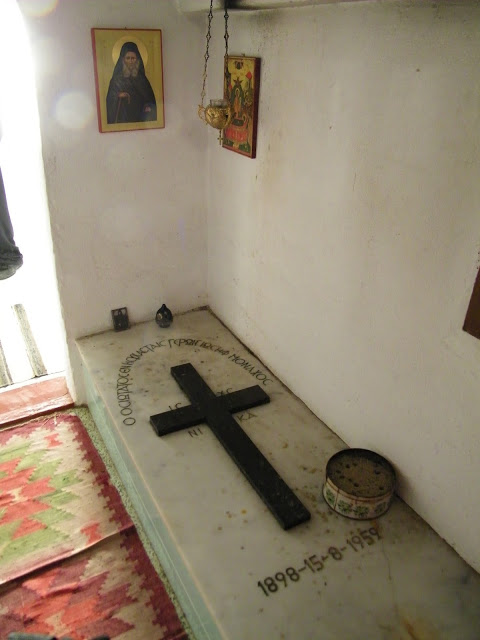
Ο τάφος του Γέροντος Ιωσήφ του Ησυχαστή
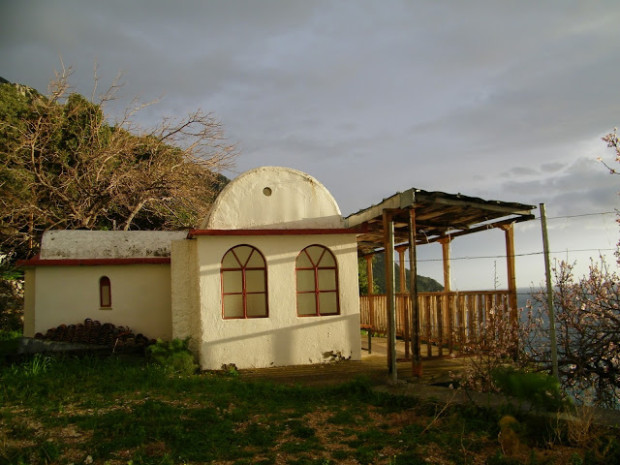
Άποψη του τάφου του γέροντος Ιωσήφ από έξω
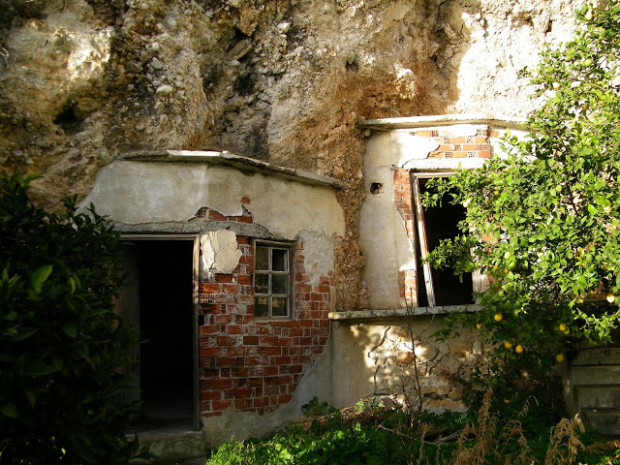
Τα σπήλαια των δύο γερόντων Ιωσήφ και Αρσενίου στην Νέα Σκήτη, Άγιον Όρος
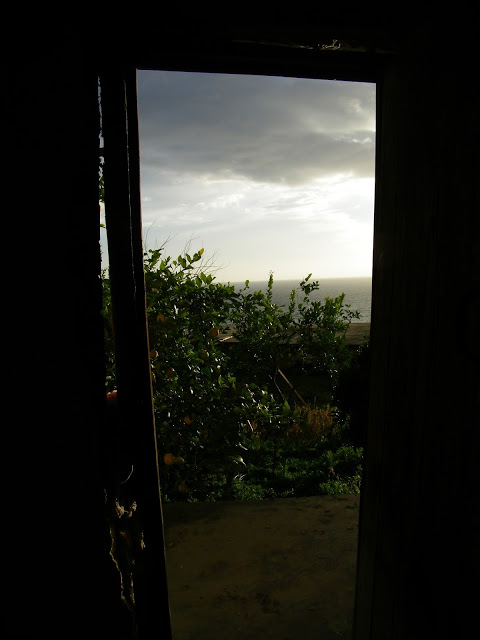
Η θέα από το εσωτερικό της σπηλιάς
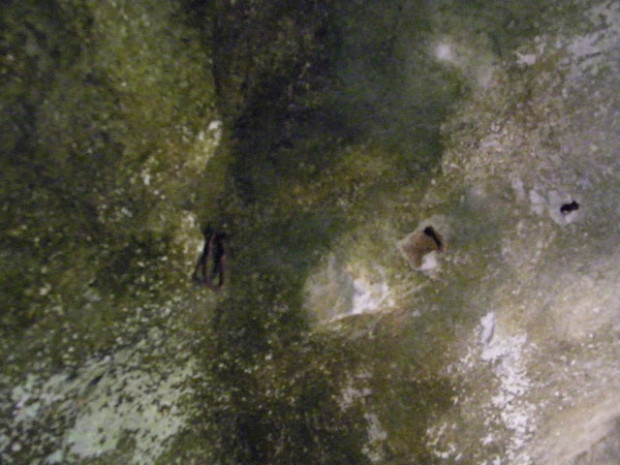
Ψηλά στον βράχο της σπηλιάς, διακρίνουμε κρίκους όπου κρεμόταν με σκοινί για τις πολύωρες αγρυπνίες
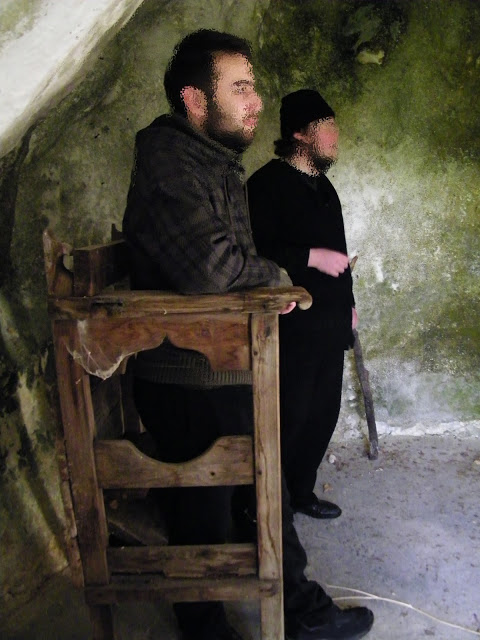
Το στασίδι στην σπηλιά
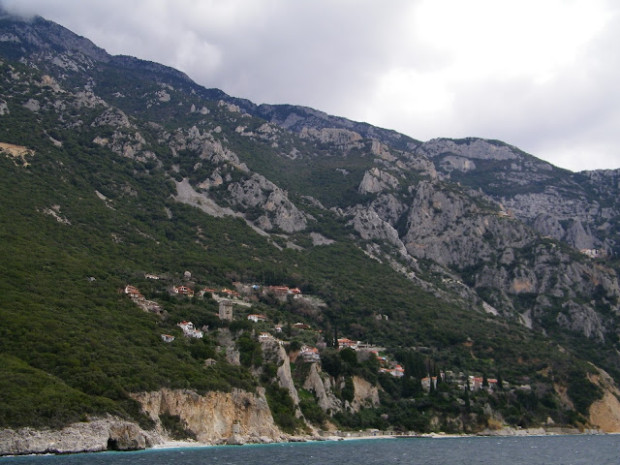
Η Νέα Σκήτη
http://www.orthodoxia-ellhnismos.gr
Γιατί κάνουμε το σταυρό μας;
Ένα από τα βασικότερα χαρακτηριστικά των ορθόδοξων χριστιανών (και όχι μόνο) είναι ότι σχηματίζουμε στο σώμα μας, με το δεξί μας χέρι, το σημείο του σταυρού. Γιατί όμως το κάνουμε αυτό, τι συμβολίζει και πόσο παλιά συνήθεια είναι;
Γιατί γίνεται;
Κάνουμε το σταυρό μας για τρεις λόγους:
α. Έτσι αναγνωρίζουμε φανερά ότι είμαστε μαθητές του Χριστού, ο οποίος σταυρώθηκε για τη σωτηρία των ανθρώπων.
β. Υπενθυμίζουμε στον εαυτό μας ότι, όπως ο Κύριος θυσιάστηκε στο σταυρό, έτσι κι εμείς πρέπει να θυσιάζουμε το συμφέρον μας, το χρόνο μας ή κομμάτια από τη ζωή μας (μέχρι και την ίδια τη ζωή μας) για τους συνανθρώπους μας.
γ. Η πείρα των αιώνων έχει αποδείξει ότι το σημείο του σταυρού λειτουργεί ως ισχυρό φυλαχτό, που προστατεύει τους ανθρώπους από τις επιρροές των πνευματικών τους εχθρών (δαιμόνων), καθώς και από άλλους κινδύνους που πιθανόν να τους απειλούν. Αυτό συμβαίνει, γιατί, κάνοντας το σταυρό μας, επικαλούμαστε το σταυρωμένο Θεό μας (το Θεάνθρωπο Ιησού) και ζητάμε τη βοήθεια και την προστασία Του.
δ. Το σημείο του σταυρού είναι μέρος της συμμετοχής του σώματός μας στην επικοινωνία μας με το Θεό, μια επικοινωνία που δεν αφορά μόνο στο πνεύμα μας και δεν αγιάζει μόνο την ψυχή μας, αλλά κάνει την ίδια ύψιστη τιμή και στο σώμα μας.
Το να διακηρύξουμε δημόσια ότι πιστεύουμε στο Χριστό (όπως γίνεται όταν κάνουμε το σταυρό μας) δεν είναι σωστό να γίνεται εγωιστικά ή υποκριτικά, αλλά ταπεινά, σεμνά και με αγάπη προς τους συνανθρώπους μας και συγχώρεση προς τους εχθρούς μας. Σύμφωνα με τα λόγια του ίδιου του Ιησού, καλό είναι να μην επιδεικνύουμε, αλλά και να μην κρύβουμε την πίστη μας. Είπε: «Όποιος με ομολογήσει μπροστά στους ανθρώπους, θα τον ομολογήσω κι εγώ μπροστά στον ουράνιο Πατέρα μου. Όποιος όμως με αρνηθεί μπροστά στους ανθρώπους, θα τον αρνηθώ κι εγώ μπροστά στον ουράνιο Πατέρα μου» (Ματθ. 10, 32-33).
Τα λόγια αυτά του Ιησού φαίνονται «σκληρά», αλλά ο Κύριος δεν είναι σκληρός. Αντίθετα, είναι ταπεινός και ειρηνικός. Τα λέει όμως για να μας παρακινήσει να Του ανοίξουμε την καρδιά μας και να ενωθούμε μ᾽ Αυτόν – σ᾽ αυτό θα μας βοηθήσει το να παραδεχτούμε δημόσια την πίστη μας.
Πώς κάνουμε το σταυρό μας;

Φωτο από το άρθρο "Πότε κάνουμε το σταυρό μας μέσα στην εκκλησία"
Αυτό φυσικά το ξέρουν και τα παιδιά. Ενώνουμε τα τρία πρώτα δάχτυλα του δεξιού μας χεριού και τα αγγίζουμε στο μέτωπό μας, μετά στην κοιλιά μας και στη συνέχεια στο δεξιό και τον αριστερό ώμο μας. Με αυτό τον τρόπο σχηματίζουμε το σχήμα του σταυρού, πάνω στον οποίο σταυρώθηκε ο Κύριος. Γι᾽ αυτό, δεν είναι σωστό να κάνουμε απλά μια αόριστη κίνηση (να «παίζουμε μαντολίνο», όπως λέει ο λαός). Αν «βαριόμαστε» ή ντρεπόμαστε να κάνουμε το σταυρό μας σωστά, κάνουμε ένα βήμα πίσω στη σχέση μας με το Θεό – και τα βήματα αυτά είναι τόσο πολύτιμα!...
Το σημαντικότερο βέβαια από τα βήματα αυτά μπορούμε να πούμε πως είναι το να αγαπάμε και να συγχωρούμε τους εχθρούς μας. Αρχίζουμε λοιπόν από τα απλά (όπως το σημείο του σταυρού) και μ᾽ αυτά ζητάμε βοήθεια από το Θεό, για να προχωρήσουμε στα δύσκολα.
Τι συμβολιζει το σημείο του σταυρού;
Κατά το μεγάλο δάσκαλο της χριστιανικής ζωής άγιο Κοσμά τον Αιτωλό (18ος-19ος αιώνας), ο σταυρός περιέχει τους εξής συμβολισμούς:
• Αγγίζουμε στο μέτωπο: ο Χριστός, ως Θεός, βρισκόταν στον ουρανό.
• Κατεβαίνουμε στην κοιλιά μας: από τον ουρανό, ο Κύριος έγινε άνθρωπος και μπήκε στη μήτρα της Θεοτόκου (της Παναγίας).
• Υψωνόμαστε στους ώμους μας: παρακαλούμε το Θεό να μας τοποθετήσει «στα δεξιά Του» (στον παράδεισο) κι όχι «στ᾽ αριστερά» (στην κόλαση), σύμφωνα με την περιγραφή της Δευτέρας Παρουσίας, που κάνει ο ίδιος ο Χριστός στο κατά Ματθαίον ευαγγέλιο, κεφάλαιο 25, στίχοι 31-46.
Τα τρία ενωμένα δάχτυλά μας συμβολίζουν την Αγία Τριάδα, ενώ τα άλλα δύο συμβολίζουν ότι ο Χριστός είναι και Θεός και άνθρωπος.
Και λίγα ιστορικά στοιχεία...
Από την ίδρυση του χριστιανισμού οι χριστιανοί σέβονται το σταυρό. Ο απόστολος Παύλος γράφει ότι «ο σταυρός του Χριστού» είναι το μόνο θέμα, για το οποίο θα μπορούσε να είναι περήφανος, και ότι «ο λόγος του σταυρού» φαίνεται ανοησία σ᾽ εκείνους που ζουν μακριά από το Θεό, για τους χριστιανούς όμως είναι «δύναμις Θεού» (Πρός Γαλάτας, 6, 14, Α´ προς Κορινθίους, 1, 18). Ο απόστολος Πέτρος ζήτησε να σταυρωθεί με το κεφάλι προς τα κάτω, θεωρώντας ότι δεν είναι άξιος να θανατωθεί ακριβώς όπως ο αγαπημένος του δάσκαλος. Το ίδιο και ο απόστολος Ανδρέας, στην Πάτρα, ο οποίος μάλιστα χαιρέτισε το σταυρό, πριν καρφωθεί σ᾽ αυτόν, και τον ονόμασε «αγιασμένο από το σώμα του Χριστού» και «γεμάτο χαρά».

Ο άγ. Ανδρέας, έχοντας αγκαλιάσει το σταυρό (σχήματος Χ) στον οποίο σταυρώθηκε (από ένα ωραίο post για τη ζωή του αγίου και την ιστορία των λειψάνων του).
Στις Πράξεις του αποστόλου Ανδρέα (ένα βιβλίο που γράφτηκε γύρω στο 150-180 μ.Χ.) αναφέρεται ήδη η συνήθεια των χριστιανών να σχηματίζουν το σημείο του σταυρού κουνώντας τα δάχτυλά τους. Το ίδιο αναφέρουν κι άλλοι χριστιανοί συγγραφείς των πρώτων αιώνων, όπως ο Τερτυλλιανός, ο Κλήμης ο Αλεξανδρέας, ο Ωριγένης, ο Λακτάντιος κ.ά. Φαίνεται ότι οι πρώτοι χριστιανοί έκαναν το σταυρό τους πάνω στο μέτωπό τους, με το ένα δάχτυλο.
Οι χριστιανοί κάνουμε το σταυρό μας όταν φεύγουμε για κάπου και όταν φτάσουμε, πριν κοιμηθούμε και αφού ξυπνήσουμε, όταν αρχίζουμε κι όταν τελειώνουμε μια δουλειά ή το φαγητό μας, όταν βάζουμε το φρεσκοζυμωμένο ψωμί στο φούρνο ή το τσουκάλι στη φωτιά, όταν ευλογούμε τα παιδιά μας ή άλλα αγαπημένα μας πρόσωπα (σχηματίζουμε σταυρό προς το μέρος τους)... Γενικά, ζούμε και πεθαίνουμε κάτω απ᾽ το σημείο του σταυρού – ώστε να κάνουμε μόνο πράγματα που αρέσουν στο Θεό και να είμαστε πάντοτε μαζί Του.
"Με απλά λόγια", έκδοση της μητρόπολης Ρεθύμνης και Αυλοποτάμου
Wednesday, August 28, 2013
Knowing God in all things
True joy comes from seeing God in all things, knowing God in all things. To know of God in the wisdom of the mind, this brings shimmers of peace and a foretaste of joy. Yet such joy is bounded, able to be swayed; for he who knows God’s presence but in part, still is able to imagine His absence. One, who sees God only in this place or in that, sees Him missing from those places in between. His joy is fleeting, for as in a moment it arises in the perception of God’s presence, so it retreats in the illusion of His absence.
The one whose joy is stable, solid and penetrating, is he who knows of God’s presence among all things, with all things, and in all things. Even as in the temple, so, too, in the school. Even as in the Church, so, too, in the field. From the brightest star to the smallest blade of grass, he sees the beautiful mystery of Christ present as all in all. He beholds the leaf with reverence, as the vessel of his direct encounter with the grace of God. He beholds his sister with love, seeing in her the energies of the blessed Divinity. He begins to see God present in more and more, and absent from less and less; until he comes to the divine realization that there is no place that God is not, that the whole of creation around him shimmers in radiance with the presence of the Most Holy. He understands that perceptions of God’s absence are but an illusion in which there is no truth.
Then is joy most full, most pure. Then it is unfailing, for in all things is God encountered; and where God is, there true joy also abides. Even in sorrow, joy is known; for the earth itself cries out in witness of Christ’s presence in the sorrow — of the divine love that pervades even the deepest human grief. In loneliness, one too finds joy: for all creation sings of the Creator’s grace, and through it the Creator Himself is present, reaching out to His children.
Behold God the all-present, all-loving, all-merciful Father, everywhere existing and ever the same. Behold the source and giver of joy, abounding in this world of life. Behold God indeed, who has the power to save and the compassion to redeem.
A Soul that is unstable can easily fall. ( St. Theophan the Recluse )
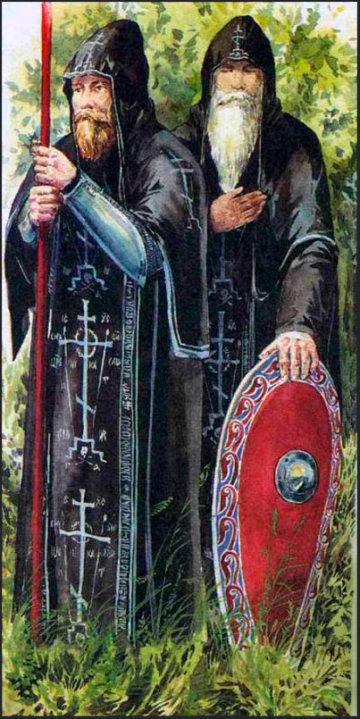
“…Timidity leads the soul into confusion and a certain unsteadiness, and a soul which is unstable can very easily fall. Yet self-satisfaction and conceit are the very enemies which one has to fight. Anybody who has let them in has fallen already, and is predisposed to further falls because they make a man inactive and negligent.
The warfare has begun. Guard your heart particularly, and do not let sinful impulses that arise reach your feelings. Meet each impulse as it enters your soul, and try to strike them all down. Be swift to establish firm convictions in your soul that are contrary to those to which your disturbing thoughts cling. These convictions will not only be your shield, they will also serve as arrows in your inner warfare. They not only defend your heart, but strike the heart of the enemy.
From this point on, the sin which arises will constantly be corrected by opposing thoughts and ideas. One must take care not to weaken or an instant, then victory will be sure, because the sinful impulse will have no firm support, but how long this will take will depend upon circumstances.”
~St. Theophan the Recluse
The last days of Elder Sofronios of Essex
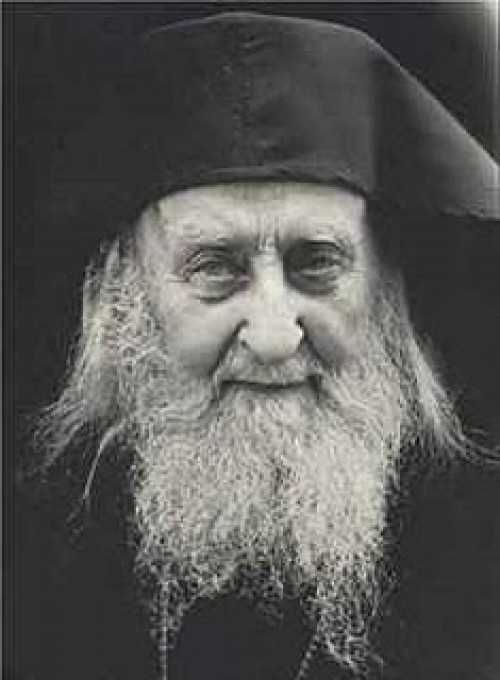
Four days before he died, he closed his eyes and did not want to talk to us anymore. His face was radiant but not sad; full of tension. He had the same expression like when he was ministering the Devine liturgy. He would not open his eyes, or utter any words, but he would lift up his hand and bless us. He was blessing us without words but I knew that he was going away. Before, I used to pray that God should let him leave longer, just as we pray during the liturgy of St. Vasilios: “prolong the time of the old”. However during those days, when I knew he was leaving, I started praying: “My Lord, give your servant a rich welcome into your Kingdom”. I was praying using St Peter’s words, as we read it in his second letter. (2 Peter 11)
Thus I was praying intensely: “Please God give your servant a rich entry into your Kingdom and place him among his Fathers”. Then, I would call the names of all his brothers, ascetics, in Ayio Oros, whom I knew he had connections with, beginning with Saint Silouanos and then all the others. …On the last day, I went to visit him at six in the morning. It was Sunday and I was ministering the morning service, while Father Kyrillos and the other priests would minister the second service. I realized that he was going to leave us that day. I began the service at Ayia Prothesi. At seven o’clock the Hours would start, followed by the Devine Liturgy. I only uttered the prayers of Anaforas, because at our monastery we say these aloud. For the rest of the time, I continued to pray: “Lord give your servant a rich welcome”.
That service was different from all the others. When I called out: “The Holy to the Saints”, father Kyrillos came into the Sanctuary. We looked at each other; he began to cry and I realized that Fr Sofronios was gone. I asked him what time he died and I knew that he passed away during the time I was reading the Gospel. I stepped aside because he wanted to speak to me and he said: Give the Holy Communion to the faithful and then announce that Fr Sofronios has passed away , then minister the first Trisagio; I will also do this during the second service. Thus, I took the Holy Communion myself and then offered it to the faithful. Then I finished the service. I still do not know how I managed this. Afterwards, I went out of the Sanctuary and told those present: “My beloved brothers, our Christ, our Lord, is the wonder of God in all generations of our times, because in His words we find salvation and a solution to every human problem. Now we must do what the Devine Liturgy teaches us: to give thanks, to pray and to plead. Thus, let us thank God because he gave us such a Father , and let’s pray for his soul. “Blessed be our Lord” and thus I began the Trisagio.
We placed his body inside the church because the tomb had not been built yet. We allowed his body to remain uncovered for four days and we were constantly reading the Gospels from the beginning to the end, and then again, as it is customary to do when priests have passed away. We continued with several Liturgies, and he was there in the middle of the church for four days. It felt like Easter! It was such a wonderful and blessed atmosphere! No one came into hysterics, everyone prayed with inspiration.
I have a friend, Archimindrite, who used to spend several weeks at the monastery during the summer, Fr Ierotheos Vlachos, who wrote “A night at the desert of Ayio Oros”. He is now a Bishop of Nafpaktos. He arrived as soon as he learnt that Fr Sofronios was gone. He felt the same veneration and said to me: “If Fr Sofronios is not a Saint, then there are no Saints”.
It so happened that some monks from Ayio Oros were present as well, because they had come to see him but did not see him alive. Fr Tychon from Simonopetra was one of them. Every time Greeks would visit England for medical reasons, they would come to the monastery so that Fr Sofronios would bless them; many had been cured this way. During the third or fourth day of his passing, a family of four arrived at the monastery. They had a child of thirteen. He had a tumor in the brain and his operation was scheduled for the next day.
Fr Tychon said to me: “These people are very upset because they came and did not find Fr Sofronios alive”. Why don’t you read some prayers for the child?”
I said to him: “Let’s go together. You read from the book and we will read some prayers together at the other Chapel. We did just that and at the end Fr Tychon said to me: “You know something? Why don’t you pass the child under Fr Sofronios’ coffin? He will be cured. We are messing about reading prayers”. I answered that we couldn’t do this, because people would say that as soon as he had died we are trying to promote his sanctification. “You do it”, I said. “You are a monk from Ayio Oros. No one will say anything”.
He took the child by the hand and passed him under the coffin. The next day he was operated upon and the doctor found nothing. He closed up the brain and said: “It was a wrong diagnosis. It was probably an inflammation”. A Greek doctor was also accompanying the child and was carrying the x ray documents, which showed the tumor. He said to them: “I am sure you know very well what this ‘wrong diagnosis’ means”.
That child is now 27 years old and in a very good health.
Archim. Zacharias
Smyrna 1922
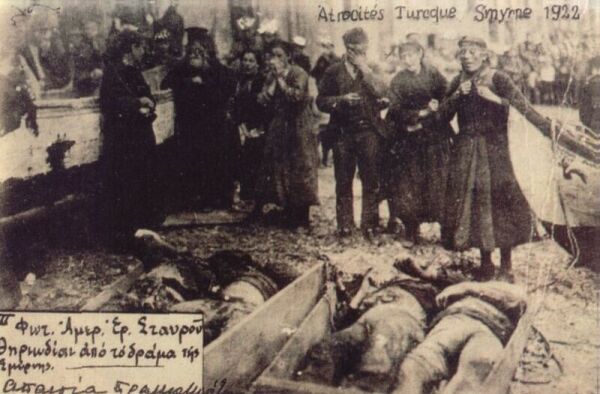
Jihad has killed over 60,000,000 Christians. The destruction of the Christians in Smyrna is told here. Islam attacked the Christians of Smyrna in 1922. It was an annihilation that took place as the Christian Europeans stood aside. Before jihad exploded out of Arabia, Turkey (Asia Minor) was a Christian nation of primarily Greek culture called Anatolia. Today Turkey is 99.7% Islamic and increasing. How did this happen?
Islam tried for centuries to crush Christianity and the Greek culture in Turkey. Constantinople, the capital, fell to jihad in 1453. Christians became dhimmis, second-class citizens. The slow grind of discrimination was punctuated by outbursts of violence. Christian Greek Anatolia was painfully changed into Islamic Turkey.
The background for these stories is that in World War I Turkey sided with the Germans (Islam sided with the Nazis in WWII). In this political chaos, Kamal Attaturk rose to power as head of the military and political government. The Allies were exhausted and did not want to get involved with another war, so they gave money to support the Greeks to fight the Turks. Long story made short, the Greeks lost.
The old Ottoman empire had fallen and a new government was arising. The leader, Attaturk, was determined to destroy the last of the kafirs in Turkey. But what he talked about to the Westerners was the possibility of business in a new country. World War I was over and America was becoming a world power. America wanted trade and influence.
The war had brought about new technology and a fusion between industry and government. A concept called Dollar Diplomacy was practiced. Trade and diplomacy became two ends of the same stick. To show how far this concept went, the American ambassador took the funds that had been raised by Christians to help the Armenians persecuted in northern Turkey and gave it to the Turks. When the Christians protested to the media, the media would not report it because of State department pressure.
The Muslim Turks killed both Greeks and Armenians that day, but this lesson will focus on the murder and theft of the Armenians. Armenia was one of the first Christian nations and has suffered monstrously at the hands of Islam. Armenia was well educated and prosperous and had always been especially despised by Islam.
Over a million Armenians were killed in Turkey in the 20th century. There are two forms of evil in this story. The first evil is what was done by jihad. The second evil was what was not done by the dhimmi kafirs.
As you read this story of the destruction of Smyrna, know that this same story is repeated today by the same players and with the same results.
It starts
Smyrna was in what was once called Asia Minor, also Anatolia. It was one of the oldest communities of Christians left in Turkey. Islam had already destroyed the other six.
Revelation 1:11 saying, “What you see, write in a book and send to the seven assemblies: to Ephesus, Smyrna, Pergamum, Thyatira, Sardis, Philadelphia, and to Laodicea.”
Smyrna, Turkey, in 1922 was a dazzling city. It was a fusion of Christian, Armenian, Greek, and Mediterranean, with some Muslims. (It was like Beirut, Lebanon, before it fell to jihad. All multicultural politics that includes Islam will fall to Islam. There have never been any exceptions.)
The West had given the Greeks the responsibility of containing the Turkish army and then turned around and prevented its victory by interference. Now the Turks, lead by Attaturk [a Muslim military leader who became ruler], began to enter the city.
The Armenians were afraid. They had experienced Islam in their old homeland in northern Turkey where the Turkish genocide had killed their ancestors. There were many warships from England, America, France and Italy in the harbor. Large numbers of commercial freighters were there from every country. The Armenians began to crowd down to the harbor.
None of the freighters would take them on. They, along with the Allied warships in the harbor, were declared to be neutral and did not want to interfere with the politics of the rising Turkish power. They were in Smyrna for business and refugees were political. Other Armenians were unafraid; they believed that the warships from Christian nations would protect them.
Thirteen lessons on islam for christians
The Turkish army entered Smyrna and began to loot the shops of the Greeks and the Armenians. Then the army turned from looting to armed robbery. Then the Turks began to rob and kill the Armenians.
Aboard the American ship Litchfield, Captain Hepburn wrote that the Turks deserved high marks for discipline and high military standards. The cover-up had started.
The Turkish army surrounded the Armenian quarter and all Muslims were told to leave the area.
Killing the christian leader
Chrysostomos was the leader of the Orthodox Christians and went to see the local commanding officer to try to arrange the evacuation of Christians. He approached the general and extended his hand. The general spit on him. He pushed Chrysostomos out the door and yelled at the Muslim crowd, “Treat him as he deserves.”
The crowd dragged him down the street until they reached a barbershop.
Chrysostomos needed a shave the crowd decided. They pulled his beard out and rubbed dog excrement on him. The man with the straight razor cut off an ear and, at the sight of blood, the mob went mad trying to get close to Chrysostomos, who was barely able to murmur, “Receive my soul into Thy Kingdom, O Lord,” before he died. They cut out his eyes, ears and nose.
There were French marines standing by and their officer forbade them to defend the Christian. The body was dragged further down the street, when they stopped and cut off his privates and put them in his dead mouth.
When they reported his murder to the French Admiral Dumesnil, he said, “He got what was coming to him.”
Nowhere to run
In the harbor small boats carried refugees to the ships. No one would let them come aboard. When people jumped into the water and clutched the lines, the sailors cut the lines and poured boiling water on the people.
They would not break their “neutrality”. Turkish forces now moved house to house in the Armenian quarter.
They broke down the doors and robbed the men. The Muslim men brutally violated the women and then pushed them naked into the streets. Men were tied together to be marched outside the city and killed. Orders went out to use the sword and stop shooting the men. The guns were too noisy, and at the time, the Turks insisted nothing was happening. As many as a hundred men were lashed at the wrists and beheaded.
Lieutenant Merrill, an American, wrote to Admiral Bristol (the top American official in Turkey) that, “No one could imagine without seeing them under fire what a chicken-livered lot the Christian minorities (Greek and Armenian) are.”
Major Davis of the Red Cross cabled Admiral Bristol that the refugees must be evacuated. The Turks were going to solve their “race” problem by annihilation.
The American consul was exhausted. He was constantly besieged by Armenians who told the same story of murder and theft. Captain Hepburn sent for the Turkish army to drive them away from the Consulate.
Later that day, he boarded the Litchfield. He sat and watched as two newsmen typed up their reports. One of them stopped and read what he had written. He threw it into the wastebasket and said he could not send it in.
It would ruin his ability to report in Turkey after this was over. The other reporter agreed that they should dig up some old stories how the Greek Orthodox Christian soldiers had committed wrongs against the Turks.
They were desperate for something to offset the evil of jihad. And they did. The news wires were filled with reports of Greeks and Armenians looting before the Turkish troops arrived. They emphasized the discipline of the Turkish troops.
But not everyone lied:
‘The Armenian quarter is a charnel house ,’ a French officer noted on 13 September: ‘In three days this rich quarter is entirely ravaged. The streets are heaped with mattresses, broken furniture, glass, torn paintings. Some young women and girls, especially pretty ones, have been taken away and put into a house that is guarded by [Muslim] Turkish sentries. They must submit to the whims of the patrols. One sees cadavers in front of the houses. They are swollen and some have exposed entrails. The smell is unbearable and swarms of flies cover them. Day and night I make a tour of this quarter, and women who are crazed join me in the street; their clothes torn, their hair flying wild, they attach themselves to me. They beg me to take them from this quarter. First there are four, then eight, then a dozen and the number of women grows. I am in uniform and just about the only one to circulate on foot. Where to take them? Everywhere is filled:
Smyrna, 1922, M H Dobkin, Newmark Press, NY, NY, 1989, pg. 136.
A charnel house is a place where bodies are deposited.
Thirteen lessons on islam for christians
The churches, the schools, the Alliance Francaise are overflowing. So I disengage myself and try to reassure them. There are no men in this quarter; all are dead, or hiding, or they have been taken away. The New York Times reported that Attaturk was punishing any soldier who violated his orders to respect life and property.
Business is business
In Constantinople Admiral Chester and his two sons saw that a lifetime dream was to be fulfilled. His Ottoman-American Development Company would obtain a 99-year contract to all the sand and gravel for road building and all right-of-way needed from quarries. All imports would be exempt from duties and taxes.
He had written in Current History that the Turks had been falsely accused during the World War. They had been benevolent to the Armenians and other minorities.
Admiral Bristol was encouraging American businessmen to get in on the deals before the Europeans got the contracts.
Now the fire
The Turks now started to bring in kerosene. Sacks of “food” turned out to be gunpowder and dynamite. Wagons filled with barrels of gasoline were brought in. The winds shifted away from the Muslim quarter and the fires started.
As the firemen would be trying to put out the fires in one house, the Muslims were pouring gasoline in the next house. ‘In all the houses I went into I saw dead bodies,’ Tchorbadjis [a French officer] said. ‘In one house I followed a trail of blood that led me to a cupboard. My curiosity forced me to open this cupboard—and my hair stood on end. Inside was the naked body of a girl, with her front cut off.
At another house there was a girl hanging from a lemon tree in the yard. There were plenty of armed soldiers going about. One of them went in where there was an Armenian family hiding and massacred the lot. When he came out his scimitar was dripping with blood. He cleaned it on his boots and leggings.
‘On one of the roads I saw a man about forty-five or fifty years old. The Turks had blinded him and cut off his nose and left him on the streets. He was crying out, in Turkish, “Isn’t there anyone here Christian enough to shoot me so that I will not get burnt in the fire ?”
In the end, the entire Armenian quarter was burned. Some of the survivors were able to be evacuated.
Wrapping up the news
Admiral Bristol’s biggest headache of the moment was the press. Eyewitnesses arriving at foreign ports were already giving out spectacular news stories to reporters, and it seemed inevitable that after the mass exodus there would be a barrage of uncontrollable publicity. On 22 September the Admiral had cabled the State Department urging the release of an official account to offset ‘exaggerated and alarming reports appearing in American newspapers regarding Smyrna fires’. He offered a sample which the State Department was pleased to use:
American officers who have been eyewitnesses of all events occurring, Smyrna, from time of the occupation of that city by Nationalists up to present, report killings which occurred at that city were ones for the most part by individuals or small bands of rowdies or soldiers, and that nothing in the nature of a massacre had occurred. During the fire some people were drowned by attempting to swim to vessels in harbor or by falling off the quay wall, but this number was small. When masses of people were gathered on quay to escape fire, they were guarded by Turkish troops but were at no time prevented by such troops from leaving the quay if they so desired. It is impossible to estimate the number of deaths due to killings, fire, and execution, but the total probably does not exceed 2,000.
Bristol’s tone suited the policy makers. In the next issue of Foreign Affairs Elihu Root, (Secretary of State) was pleading for “restraint of expression”, noting that “nations are even more sensitive to insult than individuals”.
As far as the estimate that 2,000 died, 190,000 Armenians were never accounted for.
Christian martyrs
The deaths alone are a tragedy, but the supreme tragedy is that they have all died in vain. Every Christian knows about the number of Jews killed by Hitler, but what Christian knows about the deaths of their own?
Why did the Muslims do this? It was a sacred act. It is strictly according to the code of jihad that is laid out in the Koran and the Sunna [see the Ethics chapter]. Indeed, murder and theft of the kafir in jihad is a sacrament.
If one of the Muslim jihadists had been killed, he would be declared a martyr. The sword of the jihadist is the scalpel of Allah; it is pure good. Just as a scalpel removes what harms the body, jihad, in all its forms, removes what is offensive to Allah. The Muslims who did these acts were “good and moderate” Muslims. Mohammed did these things and he defines moderation and righteous action. A jihadist is a Mohammedan.
The great stain on Christianity is that those who sought to follow Christ suffered death and destruction under jihad and they had no support of the Christian community. When a mosque is even chipped by a kafir every Muslim roars in unity.
When the Muslims desecrated the church in Bethlehem in the late 20th century, the silence of Christians was deafening.
The final lesson
The mind of those who aided Islam in Smyrna by ignoring the suffering of the victims of jihad is dhimmitude. Yes, they were greedy, but they also did not have any any knowledge about the doctrine and history of political Islam. The businessmen, diplomats, and military men were clueless about the real evil happening and how it was just the next step tofurther suffering.
It is not that Islam is so strong, but that kafirs are so weak. Ignorance of the doctrine and history of political Islam blinds the kafirs. Today, the Armenians are trying to tell their story, but no one cares, no one listens. Turkey denies the annihilation and is trying to become a part of the European Union. No one wants to talk about what could be bad for business, so the EU does not want to talk about it. It upsets the Muslims.
The punished angel
 An elder once said that there was this hermit who was living in the deepest desert for many years and had achieved the visionary charisma to such an extent that he was also in company with angels. Then this is what happened:
An elder once said that there was this hermit who was living in the deepest desert for many years and had achieved the visionary charisma to such an extent that he was also in company with angels. Then this is what happened: Two brothers, monks, heard about this hermit and wished to meet him so that they could benefit from his acquaintance. They abandoned their cells and headed towards the deserted looking for this servant of God, having in their hearts total confidence in him.
A few days later, they reached the hermit’s cave. While they were some distance away, they saw a man dressed in white, standing on one of the hills next to the hermit’s cave. He shouted at them:
“Brothers, brothers!”
They asked him: “Who are you and what do you want?”
“You must tell the elder whom you are going to meet not to forget what I had asked him to do”.
The brothers found the elder, saluted him and falling on their knees they were asking him for some advice which would help them towards their salvation. Indeed, he taught them and they benefited a great deal. They also told him about the man they had seen while they had been on their way to the cave and about his request.
The elder knew for whom they were talking about but pretended he didn’t have a clue. Instead he said: “No other man lives here”. However, the brothers who were continuously bowing in front of him and grasping his legs, made him reveal who it was that they had seen.
The elder lifting them up, said to them: “Only if you give me your word that you will not talk about me as if I am a saint to anyone until I depart for my Lord, I will explain the situation”. They did as he had asked them to and he said:
“The man whom you have seen dressed in white is the Lord’s angel who came to poor little me and said: ‘Please beg the Lord on my behalf so that I may return to my place because the time designated by the Lord has come’. When I asked him what the reason for his penance was, he said: ‘It happened that in a regional town many people had been making the Lord angry with their sins for a long time. He sent me to punish them mercifully. However, when I saw how corrupt they had been, I imposed a heavier penance so that many of them perished. That is the reason why I was sent away from the face of my Lord, Who was the One to authorize this mission’. When I said to him: who am I to intercede to the Lord for an angel, he said: ‘If I didn’t know that the Lord accepts the prayers of his honest servants I would not be coming here to pester you’.
At that very moment I was astonished at the infinite mercy of the Lord and his infinite love for man. He made him worthy of talking to Him and seeing Him. He also designated His angels to serve men and be in contact with them, just like it happened with the blessed servants Zachariah and Kornelios and Prophet Elijah and other saints. I felt admiration with all these and thanked Him for his mercy”.
Shortly after this incident, our blessed father passed away. The brotherhood buried him with honor, chanting hymns and prayers. Let us try to imitate this hermit’s virtues with the power of our Lord Jesus Christ, Who wants everyone to be saved and acknowledge His truth.
From the ‘Large Gerontiko’
Όταν πάει κανείς με τον διάβολο… (Γέροντας Παΐσιος Αγιορείτης)
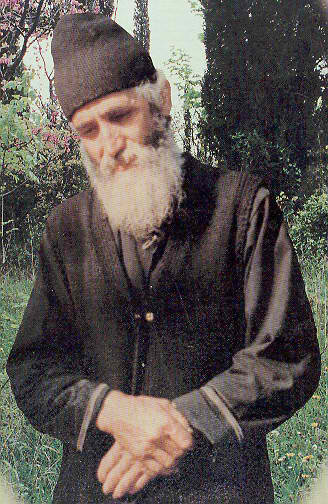 Όταν πάει κανείς με τον διάβολο, με πονηριές, δεν ευλογεί ο Θεός τα έργα του.
Όταν πάει κανείς με τον διάβολο, με πονηριές, δεν ευλογεί ο Θεός τα έργα του. Ό,τι κάνουν οι άνθρωποι με πονηριά, δεν ευδοκιμεί.
Μπορεί να φαίνεται ότι προχωράει, αλλά τελικά θα σωριάσει.
Το κυριότερο είναι να ξεκινά κανείς από την ευλογία του Θεού για ό,τι κάνει!
Ο άνθρωπος, όταν είναι δίκαιος, έχει τον Θεό με το μέρος του.
Και όταν έχει και λίγη παρρησία στον Θεό, τότε θαύματα γίνονται.
Όταν κανείς βαδίζει με το Ευαγγέλιο, δικαιούται την θεία βοήθεια.
Γέροντας Παΐσιος
Τhe Goodness of God
Beloved, follow not that which is evil, but that which is good. He that doeth good is of God: but he that doeth evil hath not seen God (3John 1:11).
One of the most common affirmations in Orthodox services is the goodness of God. Many services conclude with the blessing: “For He is a good God and loves mankind.” The goodness of God is utterly foundational to our faith – and yet that goodness is itself a mystery: it is not always apparent and remains a conundrum to those who are outside of the faith.The so-called “problem of evil” with which non-believers frequently assault belief in the existence of a good God points to the problematic character of goodness.
God is good – but not in a way that is obvious. The goodness of God can be known – as God can be known. Neither, however, are readily apparent.
In some of the early patristic writings, particularly those that can be described as “apophatic” (“unable to be spoken”) God is not only affirmed as good but as “hyper-good,” that is, His goodness is beyond anything we know – it is a transcendent goodness. The God made known in the Incarnation of Christ is indeed “unknowable.” It is the Incarnation of Christ that has made Him known.
No one has seen God at any time. The only begotten Son, who is in the bosom of the Father, He has declared Him (John 1:18)
All things have been delivered to Me by My Father, and no one knows the Son except the Father. Nor does anyone know the Father except the Son, and the one to whom the Son wills to reveal Him (Matt. 11:27).
We come to know the attributes of God in the same manner. The goodness of God is the goodness we see in the Incarnation of Christ; the power of God is the power we see in Christ; the kindness of God is the kindness we see in Christ; the love of God is precisely revealed in Christ.
St. Paul writes of the “attributes” of God being clearly seen through the things He created – but the passage is not necessarily the grounds for a “natural” theology (a knowledge of God derived from contemplating nature).
For the wrath of God is revealed from heaven against all ungodliness and unrighteousness of men, who suppress the truth in unrighteousness, because what may be known of God is manifest in them, for God has shown it to them. For since the creation of the world His invisible attributes are clearly seen, being understood by the things that are made, even His eternal power and Godhead, so that they are without excuse, because, although they knew God, they did not glorify Him as God, nor were thankful, but became futile in their thoughts, and their foolish hearts were darkened. Professing to be wise, they became fools, and changed the glory of the incorruptible God into an image made like corruptible man—and birds and four-footed animals and creeping things. (Romans 1:18-23).
St. Paul, I believe, is here describing the “fall” of man and man’s ignorance of God which it brought. The passage is consistently placed in the past tense. “Although they knew God,” etc. This is much different than saying that “knowing God” they are not thankful, etc. Instead he describes the long history of mankind before Christ as people who have become “futile” in their thoughts, and having their “foolish hearts darkened.”
However, it does seem to suggest that this knowledge can be restored as our hearts are enlightened – which is an inherent part of our living communion with Christ. But this knowledge is one that is seen only through an enlightened heart, again made possible only in the Incarnation of Christ
It is important to approach the mystery of goodness in such a manner. The goodness of God is a goodness made known in Christ and not an intellectual category or philosophical concept that can be described apart from Christ. Such a separate concept is the secularization of goodness – ultimately a blasphemous approach (“There is none good but One, that is, God” – Luke 18:19).
The mystery of God’s goodness is most especially to be found in the mystery of the Cross. In the gospels Christ is described as “going about doing good” as well as healing the diseases of people. But the depth of that mystery is found in His death and resurrection.
The mystery of the Cross is the triumph of foolishness over man-made wisdom; the triumph of weakness of man’s perceived power; the ultimate victory of good over evil. The most common image of the death and resurrection of Christ in the Eastern Church is the icon of Christ’s Descent into Hell – for it is this icon that carries the fullest expression of the theological content and reality of His death and resurrection. It not only depicts his victory over death and evil (shown as the devil bound in chains), but also show the cosmic and timeless element of His victory as He grasps the hands of Adam and Eve to lead them out of the bondage of sin and death.
The Christian definition of good is the goodness of God. In the world in which we live we do not see that goodness in abstraction but in the fullness of its conflict with evil and its ultimate triumph. The Gospel presumes and acknowledges the presence of evil while at the same time affirming that goodness, in Christ, overcomes that evil.
In the classical teaching of the Fathers, evil is not a something, a force or a presence: it is an action driven by a distorted will. It is an opposition to God, but without meaning or substance except as an opposition. Evil is thus not a presence, but a tragic movement towards absence. It is not communion with God but a self-ward movement towards non-being.
The great struggle within our world, as presently constituted, is not between ourselves and the forces of a blind and rudderless nature, but a struggle with the consequences of that relentless challenge. The Cross is not an image that excludes the brutal forces of wicked powers – it is the triumph of love and forgiveness in the very heart of those struggles.
Goodness cannot be abstracted from the human tragedy – it is known and experienced within the very context of that tragedy in the fullness of the Cross of Christ. This is a radical departure from the philosophical discussion of the problem of evil. Christianity is not a set of ideas that compete on the playing field of philosophical systems. It is event and relationship neither imaginary nor abstract. This occasionally leaves classical Christianity at a disadvantage – unwilling to grant the givens of an alien philosophy – and thus seeming silent or weak in the face of a serious intellectual challenge. But Christianity is a language that is spoken in the tongue of the Logos, whose incarnation, death and resurrection speak with the eloquence of the true and living God.
St. Paul recognized that his preaching of the Cross of Christ would either make him seem weak or foolish. It is a weakness and a foolishness that modern Christians should not disdain. For the weakness of God is stronger than death. The foolishness of God is wiser than all men.
So Your Child Wants to be a Monastic?
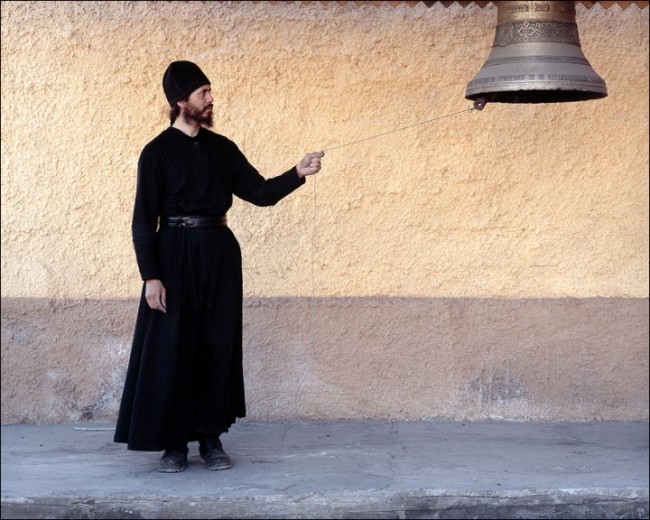
The following talk (slightly condensed) was given [in 1984] at the Saint Herman Winter Pilgrimage in Redding, California.
I should like to ask you to think of something you may not have considered before, How would you feel if your son or daughter expressed the desire to enter a monastery? You may be Orthodox, and very devout; you may he diligent in attending services and reading spiritual books; you may have tried your best to raise your children in an Orthodox manner; you may even admire monasticism. Nonetheless, how would you really feel?
We live in a time and society quite different from Greece and Holy Russia, where monasticism was a visible and acceptable part of life. It was not uncommon for entire families to make pilgrimages to monasteries. Few people today, however, have any significant exposure to monasticism and it is little wonder that in our un-Orthodox and even anti-Christian society, the very thought of one’s child becoming a monastic can seem very threatening.
There are a number of reasons one can give for such a reaction. Lack of familiarity breeds fear. Not a few people imagine monasticism to be very grim and even inhuman. They may envision their child locked behind a grating and subsisting for the rest of his or her life on bread and water. The other extreme is an equally- erroneous view of a romanticized spiritual state in which the child spends his days floating above the ground in an exalted state of endless holiness. In both cases it is imagined that entering a monastery presupposes leaving behind the human race. The reality of the monastic life is a far cry from either of these extremes. Your son or daughter—who is always late, leaves socks and soda bottles everywhere and is generally infuriating–will not turn into an instant anchorite. Anyone who leaves the world for the monastery brings all of his weaknesses and defects with him. He may learn to overcome some of them; others he will have until bodies, In any case, if your child becomes a monastic, he or she will not be living without human warmth and human relationships, and in spite of everything, you will still recognize them as being one of your own progeny.
Whatever your initial reaction to the issue of monasticism and your child, it depends to a great extent on how you as a parent view the Orthodox family and your position as an Orthodox individual in the contemporary secular world. Surrounded as we are by worldly standards and a materialist culture, we forget that Christ calls all of His followers to separate themselves from the world: Be not of this world. This is the trumpet call of monasticism. With this understanding, you should be more ready to peacefully acquiesce to the son or daughter who has found it in his heart to answer this call by taking upon himself the monastic yoke.
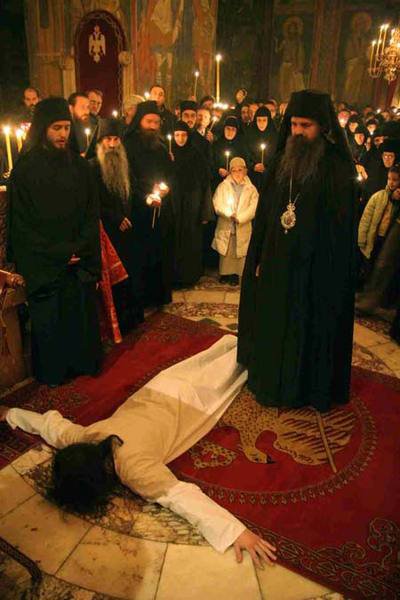
We are, however, the unfortunate products of our fallen nature, and it is rare that even a pious Orthodox parent is thrilled to hear that their offspring desires to enter a monastery. More often there arise some very strong reactions in the heart which, however innocent and well-intentioned, are nonetheless aspects of our fallen emotional and psychological nature – and a sad reflection of our un-Orthodox background and environment. With this in mind we can examine some of the emotional responses which this issue so often evokes.
Verbally, the various emotions stem from the pivotal question, “Why?” Why does anyone leave the world to enter a monastery? If the reason is legitimate, it is because in spite of all his failings and weaknesses, your child loves God more than anyone or anything in the world–more than the life you helped shape him for, more than his automobile, more than the school to which you were going to send him, more than his family… And here the very natural feeling of jealousy arises. As parents you may endeavor to replace God as being central in your child’s affections and persuade him to forsake monasticism, If you succeed, you will only make the child unhappy, and if you fail, you’ re going to feel very hurt.
Secondly. you may feel estranged or shut out from your child’s life. If your daughter goes to a monastery, and it’s a life you have not shared, you may feel you can’t relate to her. If she married, even if she moved a thousand miles away, you would very likely feel that you were still more a part of her life than if she became a nun and lived 50 miles away. A married daughter would still need advice on how to cope with the children’ s illnesses or how to manage a tight budget. On the other hand, if she were in a convent, you could hardly give her advice on how to do Matins, and even if you are Orthodox, you might feel emotionally adrift and very awkward with this suddenly foreign someone in black whose life is so different from your own. Then there is also the fact that most parents look forward to being grandparents, this is a big issue, especially with mothers.
You may feel threatened. You spend your whole life nurturing the well-being of your children: you feed them and worry over them; you help them to discover their abilities and you encourage them to develop their talents. Perhaps your son is a natural musician or your daughter a born lawyer, and you spend your life supporting them–emotionally and financially–and preparing them to be successful in the world. And after all these years of effort and anxiety, they suddenly decide they want no part of it, they don’t want the world, nor the life that you envisioned for them. This can be a very threatening and painful revelation. Very often parents feel that in rejecting the world, their child is also rejecting them. This is not necessarily true at all, but this feeling sparks most of the disputes between parents and their children over the issue of monasticism. Here also parents may feel they have failed in some way in their raising of the child, that he or she should choose such an “aberrant” path in life. This is also a painful thought.
The rather heated emotions which may arise over the issue of monasticism and one’s child frequently result in a barrage of reproaches. The following examples are not in the least hypothetical; they come from a list of actual remarks made by real mothers and fathers, some of whom consider themselves to be devout Orthodox. Their responses illumine the essence of the dispute as it is felt in the heart of those who are Orthodox and yet live in the world. They’ve said that we are not taking responsibility for ourselves; that we are just leaning on someone else so as to avoid having to make our own decisions. They say that if we love our neighbor we should be working to improve society and not dropping out of it into some euphoric dream. We often hear that monasticism is mere ostentation, some kind of fake spirituality: “Why don’t you stick it out in the world like the rest of us, where you have to deal with real life and real problems?” They say monasticism is selfish, egocentric, it divides and ruins the family; monasticism is “financially unstable”: What about your future security? Why don’t you just get a good job and send them all the money?…
While these remarks are quite varied, there is a common denominator, and that is worldliness. They are all rooted in a very worldly orientation. It is the complete and absolute rejection of this perspective on the part of the monastic aspirant which often makes the dispute between parents and child so violent, Although perhaps unconscious, the parents’ message underlying all this is: Conform yourself to the world; fit in; get a secure job; settle down; do what everyone else does…; spirituality is fine, but there’s no need to be extreme. We have already seen, however, that Christianity is otherworldly; by its very notate it is extreme: if you lose your life you shall gain it; if you try to hang onto it you will lose it; God became man that men might become gods. What could be more extreme?
Seek ye first the kingdom of God
Orthodoxy is the means by which we ascend unto God, through surrendering our own ego and self-will. Orthodoxy means war–against one’s fallen nature, against the devil, and against the world. This applies to all Orthodox Christians. Even those who live in the world–who have children and hold jobs–are required to keep themselves in some sense apart from the world. And there can be no compromise. The world is not and cannot be our home, and whether we choose to marry Christ or an earthly spouse, we can in no sense marry’ the world. We see, however, that it is precisely this desire–to have both God and the world–that is at the rooter the conflict evoked by the child’s entrance into monasticism. Experiencing their own reaction to the child’s rejection of the world may make the parents realize, perhaps as never before, their own attachment to the world, and how unwilling they are to sever themselves from the values and desires of the anti-Christian society in which they live.
It is especially difficult to struggle against the accepted view of the family which in this country has received a pseudo-religious status; youngsters are often all but worshipped as gods by their parents who see them as fulfilling their own egos. This is not Orthodox; it is, in fact, very destructive of our Orthodoxy which teaches that children are not the possession of their mothers and fathers: they are not playthings of their parents’ imaginations. Children are given by God for a time that they may be raised up in the knowledge of Him, and after that He summons them as He will. The duty of parents is not to prepare children to settle comfortably in the world, but to shepherd their souls, to prepare them to battle against the fallen world. Those who choose to fight in the front lines are those who hear the monastic calling. If your child wants to enlist in that war, he will swear before God and man that despite his sinfulness and frailties that overwhelm him at every hour of the day, he cannot find rest apart from God.
If such is the inclination of your child, do not hold him back, however logical your reasons For wanting to do so may be. If the desire for monasticism is simply a fanciful notion, they will find out soon enough, and nothing will be harmed by their trying. If, however, such a desire has indeed been planted by God as a means of their achieving salvation, don’t thwart it by trying to persuade him first to finish school or experience life in the world. Bring to mind the countless number of monastics, both men and women, whose spiritual legacy has so greatly enriched our holy Orthodox Church. If your child has the desire and determination to follow in their steps, however weakly, bless him, let him go. And may this blessing be also unto your own salvation and that of others.
Subscribe to:
Posts (Atom)







